The winner of the Masters the year you were born - and what they won
Lydia Warren

- The Masters, which runs from April 8 to 11 this year, has been an almost annual event since 1934.
- When Horton Smith won the inaugural Masters in 1934, he was awarded $1,500 - about $29,000 today.
- Dustin Johnson won 2020's delayed tournament with the lowest score ever, taking home $2 million.
1934: Horton Smith
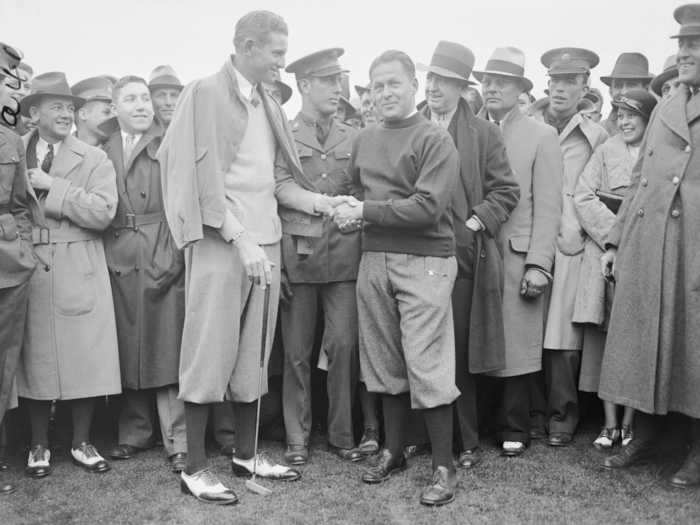
Nationality: American
Score: 284 (-4)
Winnings: $1,500 ($29,600 in today's money)
In what would be his first of two wins, Smith won the inaugural Masters, then officially called the Augusta National Invitation Tournament.
But much of the fanfare was around legendary golfer Bobby Jones, who founded and helped design Augusta National, the home of the Masters. Jones came out of retirement to play and came in 13th.
1935: Gene Sarazen
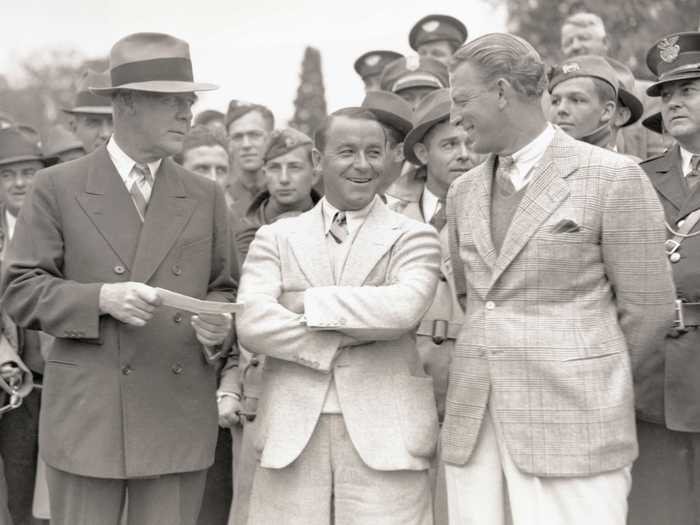
Nationality: American
Score: 282 (-6)
Winnings: $1,500 ($28,600 today)
With four holes left, Sarazen trailed Craig Wood by two strokes, but holed an incredible, rare double eagle on the 15th — the World Golf Hall of Fame called it "arguably the most famous shot in tournament history." It allowed him to tie Wood for first place on the 18th.
Ultimately, Sarazen defeated Wood in a 36-hole playoff, shooting 144 to Wood's 149.
1936: Horton Smith
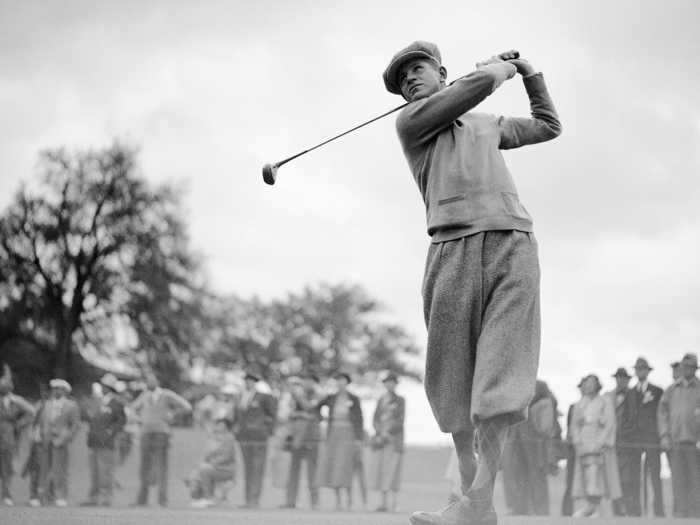
Nationality: American
Score: 285 (-3)
Winnings: $1,500 ($28,800 today)
Smith took his second win in just three years. He's one of 17 players to win the Masters multiple times.
"There is nothing monotonous about that course, and it is one of the most beautiful I ever played," Smith said, according to the Augusta Chronicle. "Each one of the holes presents something new."
1937: Byron Nelson
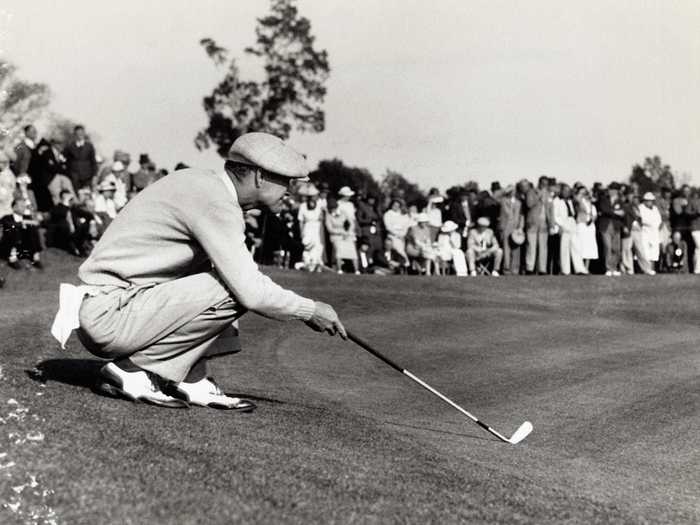
Nationality: American
Score: 283 (-5)
Winnings: $1,500 ($27,600 today)
Nelson, who would win again eight years later, "possessed exquisite form, his aggressive lower body action and 'square' club position becoming the model for the modern golf swing," the New York Times reported on his death in 2006.
1938: Henry Picard
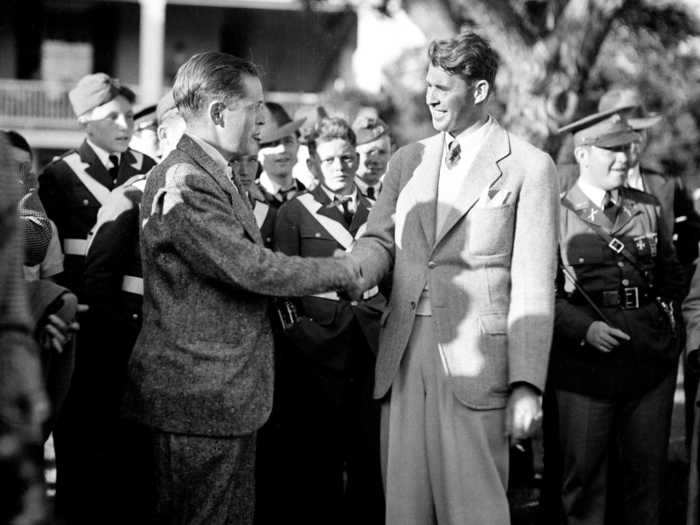
Nationality: American
Score: 285 (-3)
Winnings: $1,500 ($27,800 today)
Picard battled bad weather, which caused a delayed start to the tournament, to take a two-stroke lead on the 18th for a 3 under par.
1939: Ralph Guldahl
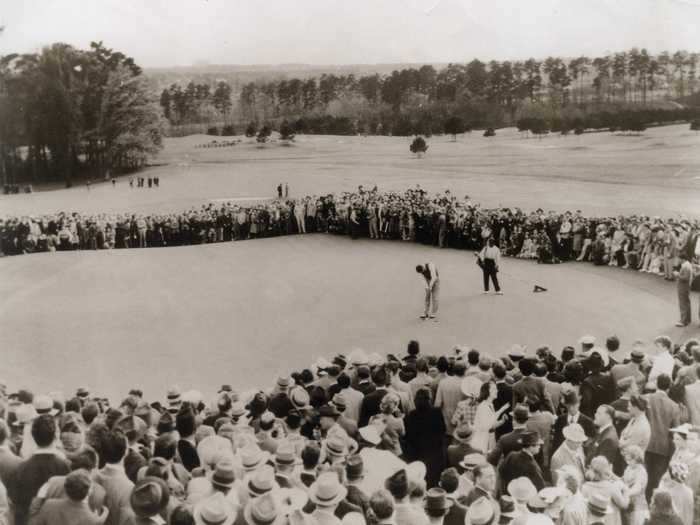
Nationality: American
Score: 279 (-9)
Winnings: $1,500 ($28,600 today)
After placing second for the two years prior, Guldahl finally secured a victory in 1939, with an impressive 9 under par, a new course record.
Also in 1939, the name of the tournament was officially changed from Augusta National Invitation Tournament to the Masters Tournament.
1940: Jimmy Demaret
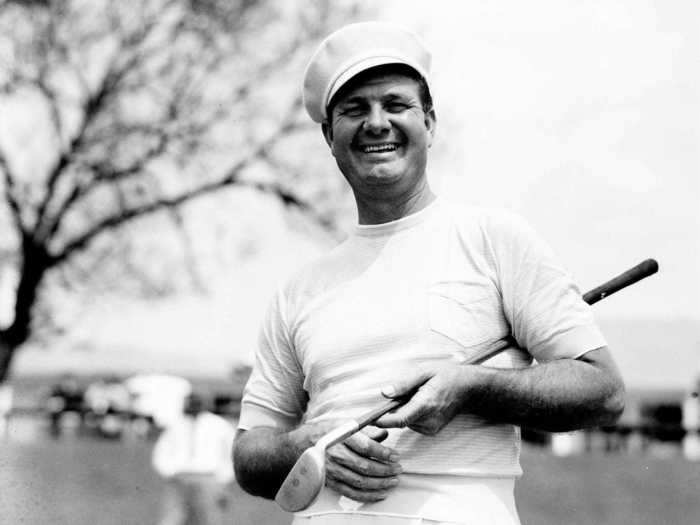
Nationality: American
Score: 280 (-8)
Winnings: $1,500 ($28,200 today)
Demaret secured his first of three Masters titles while keeping a surprisingly cool head, the Augusta Chronicle reported at the time.
"He clicked off the final round in machinelike precision despite tremendous pressure, never once appearing concerned about how it all might end," wrote sports columnist Tom Wall.
Starting this year, the Masters went ahead during the first full week in April each year.
1941: Craig Wood
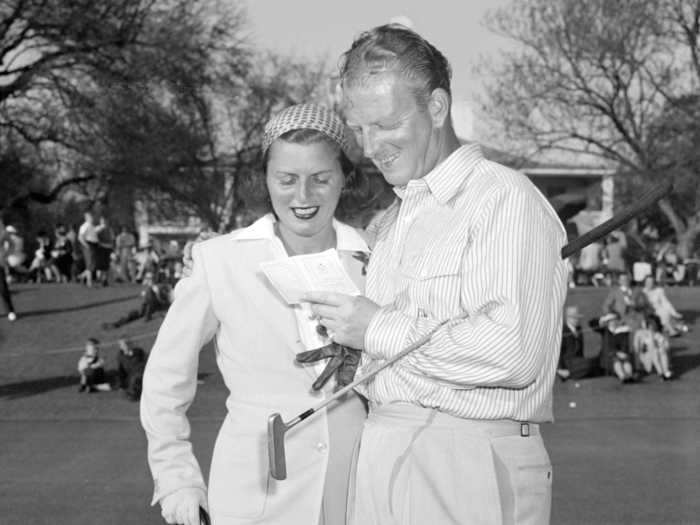
Nationality: American
Score: 280 (-8)
Winnings: $1,500 ($27,600 today)
Wood was another serial runner-up, famously losing to Gene Sarazen following his "shot of a lifetime" in 1935. But in 1941, Wood maintained the lead from start to finish, ultimately beating Byron Nelson by three strokes to win his first and only Masters title.
1942: Byron Nelson
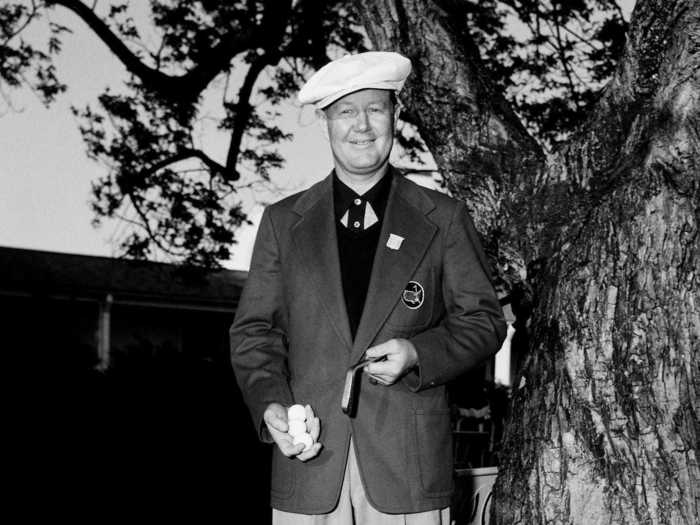
Nationality: American
Score: 280 (-8)
Winnings: $1,500 ($24,500 today)
Nelson got off to a bad start on the last day of the 1942 tournament, floundering with a double bogey at the first hole. But he turned it around and ultimately took his second Masters title following a nail-biting battle against fellow Texan Ben Hogan.
"Except for the first hole, I think that was the finest round of golf I ever shot," Nelson said.
1943 - 1945: No tournament was held, due to World War II.
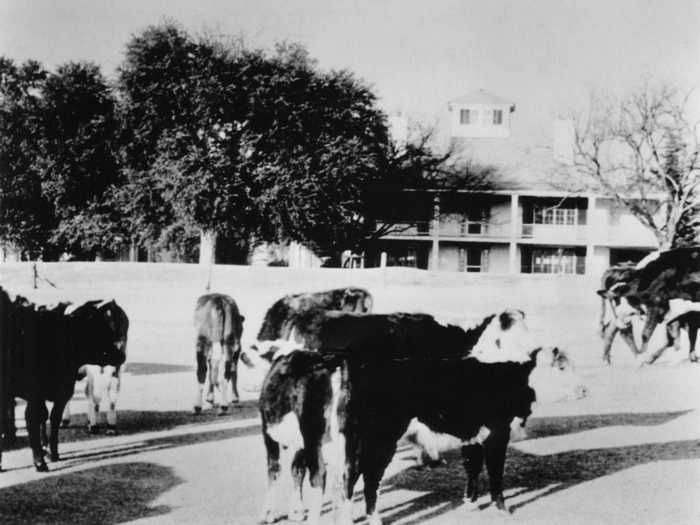
The 1942 tournament was the last held during the war, and the Masters was put on a three-year hiatus.
With no one using the course, 200 cows were let loose there instead — Bobby Jones figured they could control grass levels before providing meat to the local area. However, Yahoo Sports reported, it turned out that the cows weren't needed to manicure the property's Bermuda grass, which doesn't grow in the winter, and unfortunately they started snacking on flowers instead.
So the club switched the cows for turkeys, raising more than 1,000 for members' Christmas dinners.
1946: Herman Keiser
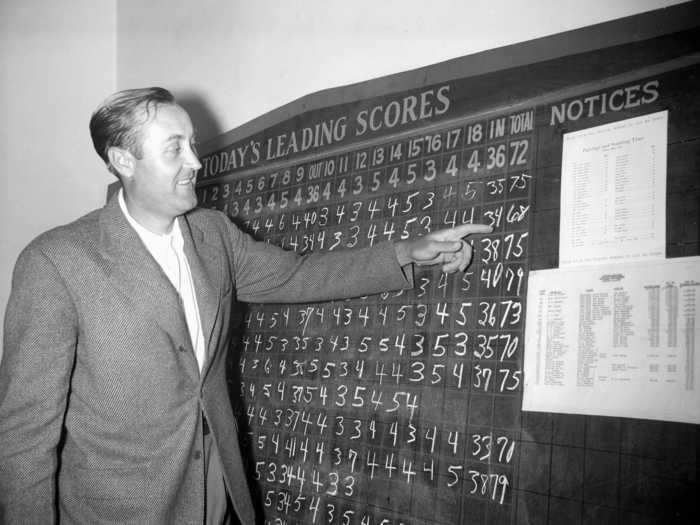
Nationality: American
Score: 282 (-6)
Winnings: $2,500 ($35,700 today)
When the tournament resumed in 1946, Keiser unexpectedly took the title, beating favorite Ben Hogan. He had faith in his own skills though — in 2000, his daughter recalled how he'd borrowed money from "a couple of guys" so he could bet on himself, ultimately winning $1,000 from the bets, or around $14,000 today.
1947: Jimmy Demaret
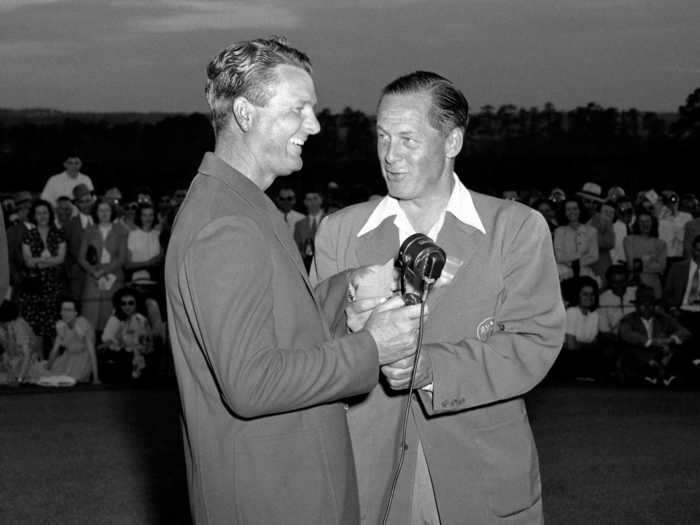
Nationality: American
Score: 281 (-7)
Winnings: $2,500 ($30,000 today)
In his second Masters win, Demaret shot four sub-par rounds, the first tournament winner to do so.
1948: Claude Harmon
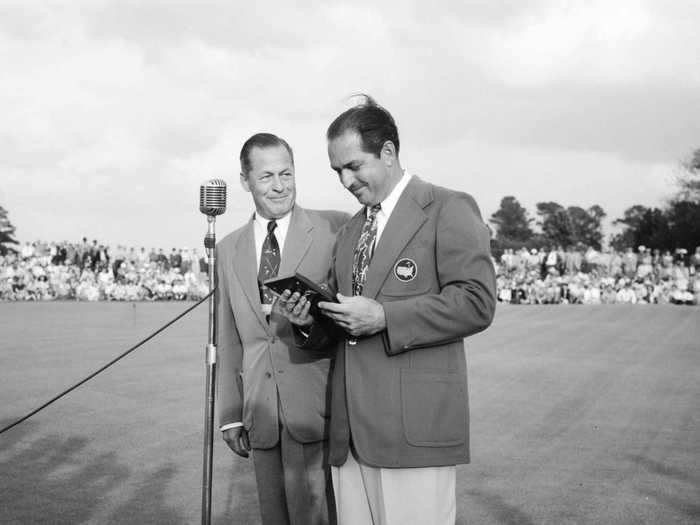
Nationality: American
Score: 279 (-9)
Winnings: $2,500 ($27,600 today)
Harmon, a club pro, won by five-stroke lead over Cary Middlecoff, setting a record for margin of victory and matching Ralph Guldahl's 1939 low score for 72 holes of 279.
1949: Sam Snead
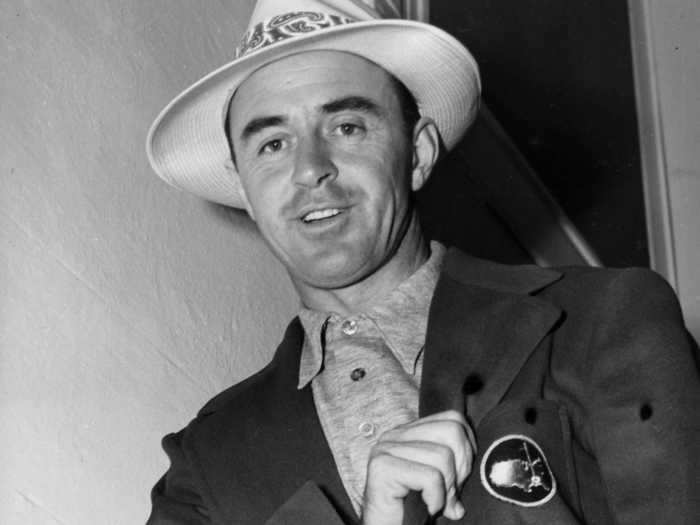
Nationality: American
Score: 282 (-6)
Winnings: $2,750 ($30,300 today)
Snead was the first Masters winner to be awarded a green jacket, a tradition that continues to this day. The previous winners — nine in total — were retroactively awarded jackets.
1950: Jimmy Demaret
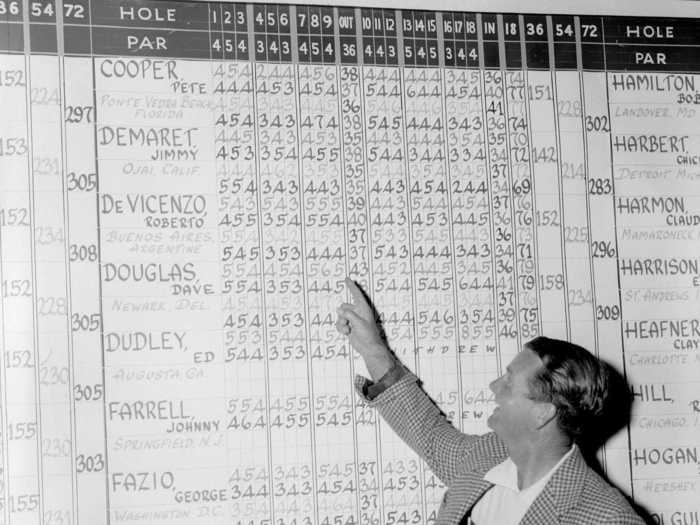
Nationality: American
Score: 283 (-5)
Winnings: $2,400 ($26,700 today)
Demaret became the first three-time winner in part thanks to fellow competitor Jim Ferrier's multiple bogeys.
Augusta Chronicle sports editor Randy Russell wrote: "Demaret, whose colorful garb made him look like an Easter egg rolling along the greensward, backed in to the victory that made him the first man in history to win the Masters three times."
1951: Ben Hogan
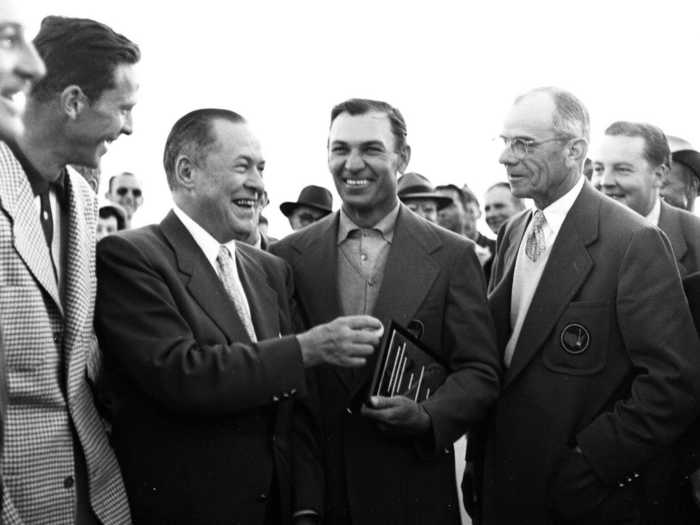
Nationality: American
Score: 280 (-8)
Winnings: $3,000 ($30,600 today)
It was Hogan's 10th Masters appearance, and he finally took a win after coming in second twice in the '40s. Tournament Chairman Clifford Roberts (pictured right) commended Hogan's perfectly executed final 18 holes — he didn't bogey a single one.
Hogan told reporters he "got a big bang out of it."
"If I never win again, I'll be satisfied. I have had my full share of golfing luck," he said, according to Mark Baron at Golf History Today.
He would win again, however.
1952: Sam Snead
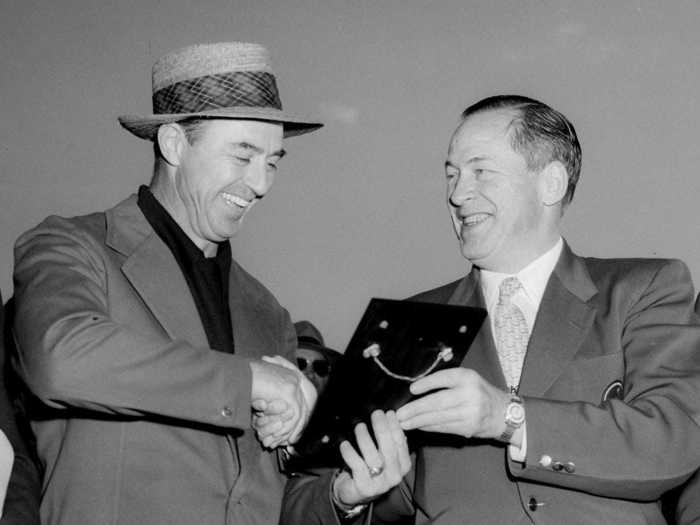
Nationality: American
Score: 286 (-2)
Winnings: $4,000 ($39,900 today)
Overcoming windy conditions and a 77 in the third round, Snead's 72 for the final round ultimately allowed him to win by four shots.
Following a suggestion from Hogan after his 1951 win, this was also the first year all previous winners dined together, an annual tradition now known as the Champions Dinner.
1953: Ben Hogan
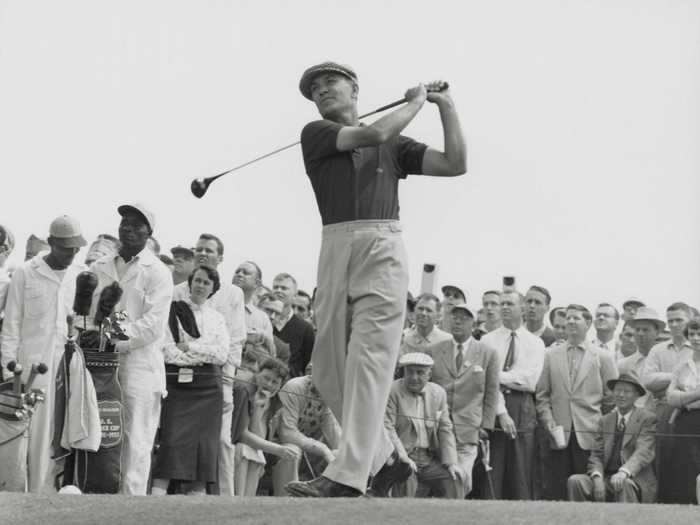
Nationality: American
Score: 274 (-14)
Winnings: $4,000 ($39,600 today)
Hogan finished with an incredible 72-hole score of 274 — a low-score record that would stand for 12 years.
When Hogan passed away in 1997, the New York Times called him "perhaps the most creative shotmaker in the history of golf and one of its most accomplished players."
1954: Sam Snead
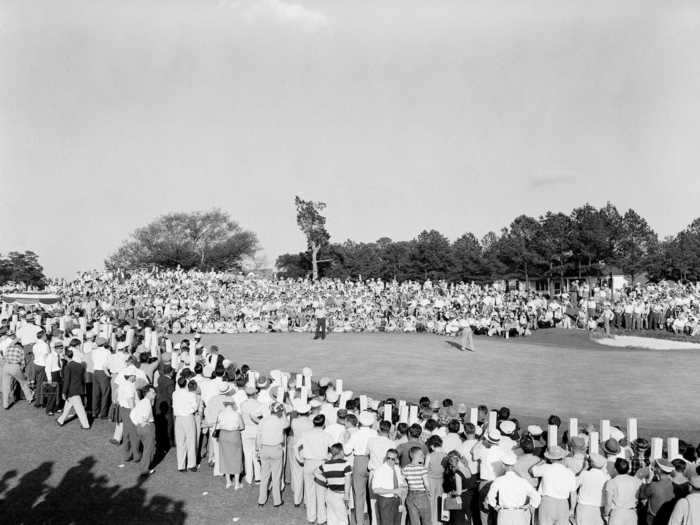
Nationality: American
Score: 289 (+1)
Winnings: $5,000 ($49,000 today)
Snead beat Hogan by one stroke in an 18-hole playoff to take the title, his third.
Five players have won the Masters three times: Jimmy Demaret, Gary Player, Nick Faldo, Phil Mickelson, and Snead.
1955: Cary Middlecoff
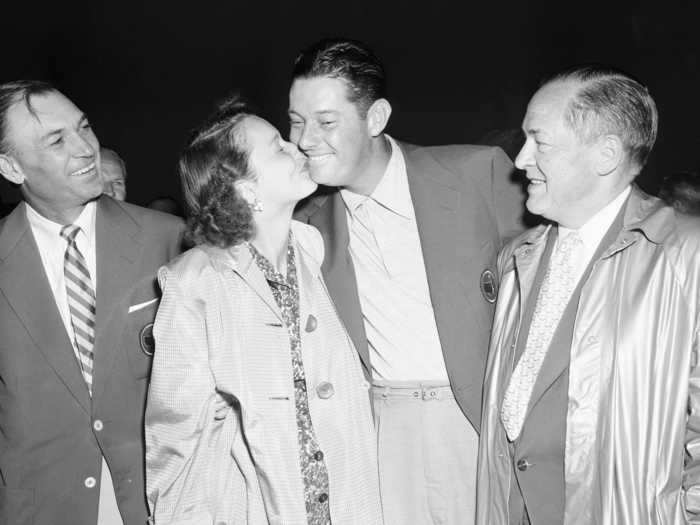
Nationality: American
Score: 279 (-9)
Winnings: $5,000 ($49,300 today)
Middlecoff, who worked as a dentist before becoming a full-time golfer, set a new record for margin of victory — he finished seven ahead of runner-up Ben Hogan.
Despite his prowess, the champion was also known for his nerves on the course.
''I don't deny I'm nervous,'' he once said, according to the New York Times. ''I have always maintained that a man who is not nervous is either an idiot or has never been close enough to winning to get nervous."
1956: Jack Burke Jr.
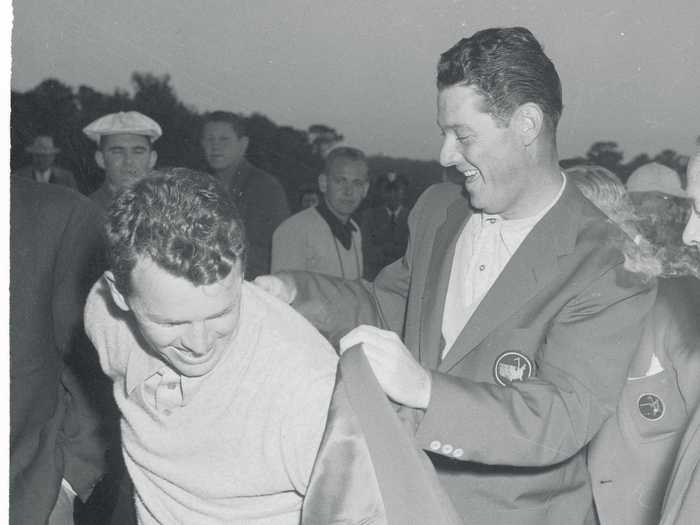
Nationality: American
Score: 289 (+1)
Winnings: $6,000 ($58,700 today)
After the first three rounds, it looked like amateur Ken Venturi might take the win. But on the last day, thanks in part to bad weather, he carded seven bogeys over the last 10 holes and finished with a disappointing score of 80.
As the Augusta Chronicle wrote, "that enabled Burke to mount the largest comeback in Masters history."
Despite arriving with just 15 minutes to warm up after attending church that morning, Burke scored 71 and ultimately took the title with a tie for the highest winning total in Masters history, 289.
1957: Doug Ford
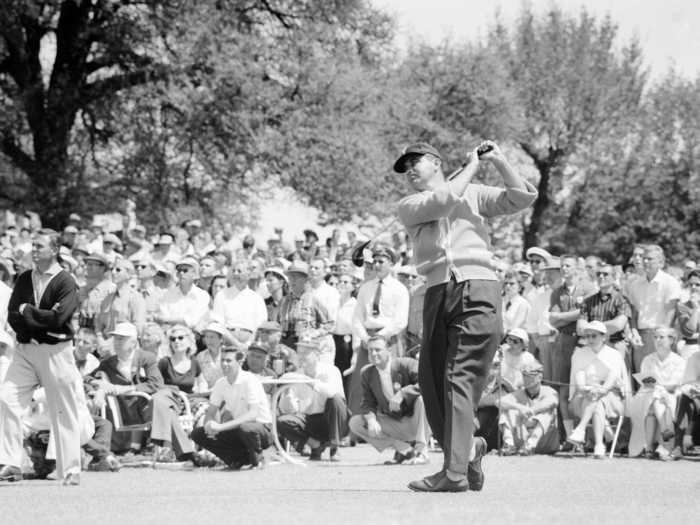
Nationality: American
Score: 283 (-5)
Winnings: $8,750 ($82,500 today)
Ford shot a 66 in the final round to beat Sam Snead, thanks, in part, to a bold shot on the 15th, ignoring the advice of his caddie to play it safe and ultimately securing a birdie.
"That shot," Ford told The Augusta Chronicle in 2017, "was what won it."
Ford would take part in 49 Masters in his career which, according to the Chronicle, is third-most in tournament history, after Gary Player (52) and Arnold Palmer (50).
1958: Arnold Palmer
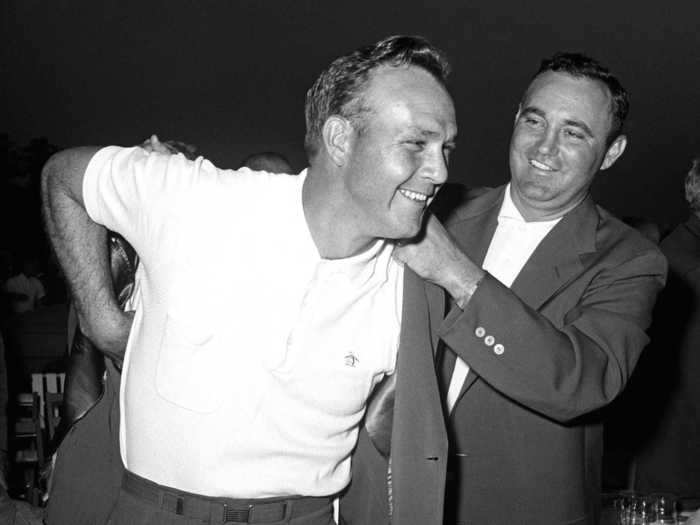
Nationality: American
Score: 284 (-4)
Winnings: $11,250 ($102,400 today)
Palmer's 1958 Masters win — his first of four — remains one of the most controversial in tournament history. After he embedded a ball on the 12th hole in the final round, he played a second ball, despite the official saying he was not allowed. He made a double bogey with the first and par with the second, and officials later told him he was allowed the better-scoring ball. Afterwards, opponent Ken Venturi, who was playing alongside Palmer on the 12th, said he'd failed to follow the rules.
However, Doug Ford, who lost the 1958 Masters to Palmer by one shot, told the Los Angeles Times in 2004 that he trusted Palmer did the right thing.
"The man is the most honest man you ever want to meet," he said. "His integrity should not be [put through] what they're trying to do. If he thought he was right, then I would never question it."
1959: Art Wall Jr.
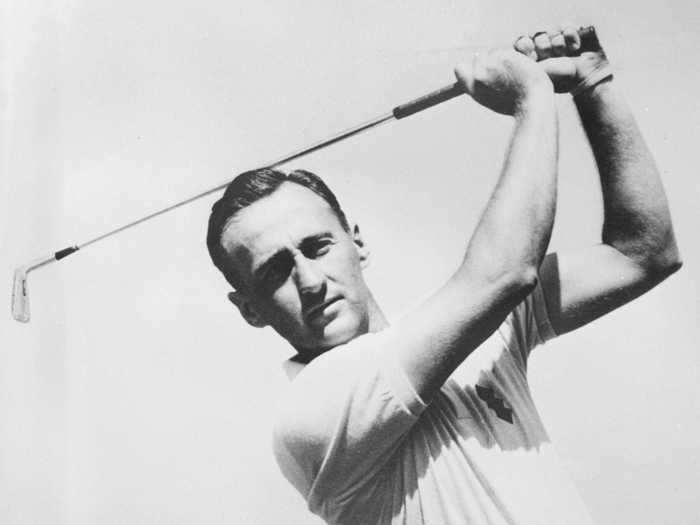
Nationality: American
Score: 284 (-4)
Winnings: $15,000 ($136,000 today)
"In the final round, Wall put on one of the most dazzling displays of golf ever seen at Augusta National Golf Club," the Augusta Chronicle reported.
He ultimately beat former champ Cary Middlecoff on the 18th by sinking an 11-foot putt.
1960: Arnold Palmer
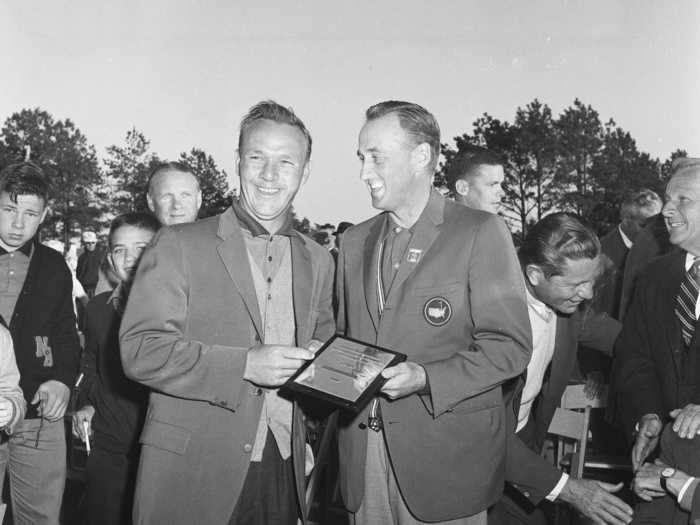
Nationality: American
Score: 282 (-6)
Winnings: $17,500 ($156,000 today)
Palmer took the title just two years after his first win, making birdies on his final two holes to beat Ken Venturi by a single stroke.
1961: Gary Player
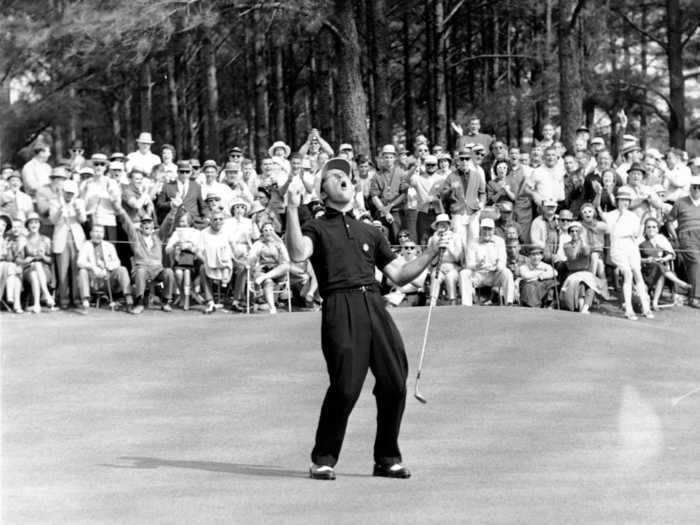
Nationality: South African
Score: 280 (-8)
Winnings: $20,000 ($176,500 today)
Palmer was again in contention for the green jacket, but he made a double bogey on the final hole, making way for a victory by Gary Player, the Masters' first international champion.
"It was a very important thing because it gave encouragement for many to follow suit," Player said of his win. "There's an international player who can do it."
1962: Arnold Palmer
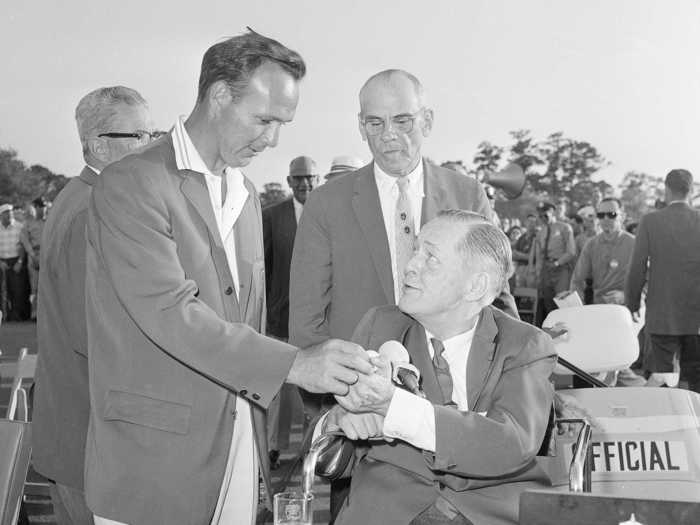
Nationality: American
Score: 280 (-8)
Winnings: $20,000 ($174,200 today)
Palmer and Player went head-to-head again the following year, but this time, it was Palmer who walked away victorious following an unmatched performance on the back nine.
1963: Jack Nicklaus
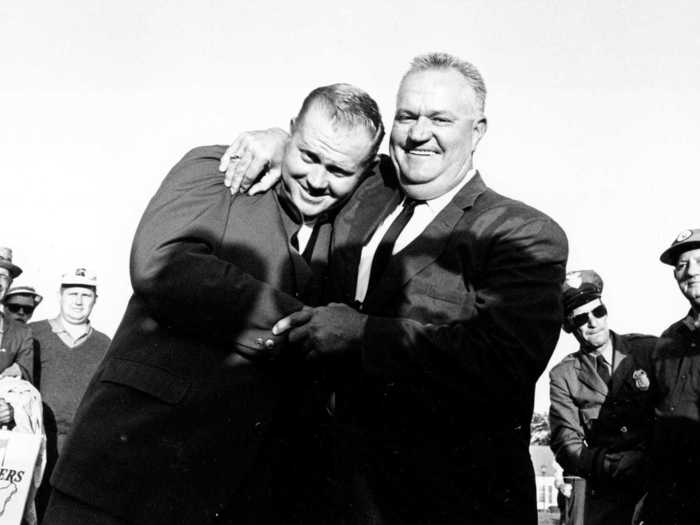
Nationality: American
Score: 286 (-2)
Winnings: $20,000 ($172,500 today)
In 1963, 23-year-old Nicklaus won his first Masters. He would go on to win five more times between 1965 and 1986, setting the record for the most wins in tournament history.
Also that year, Horton Smith, the first-ever winner, played his last Masters. He passed away six months later, at the age of 55.
1964: Arnold Palmer
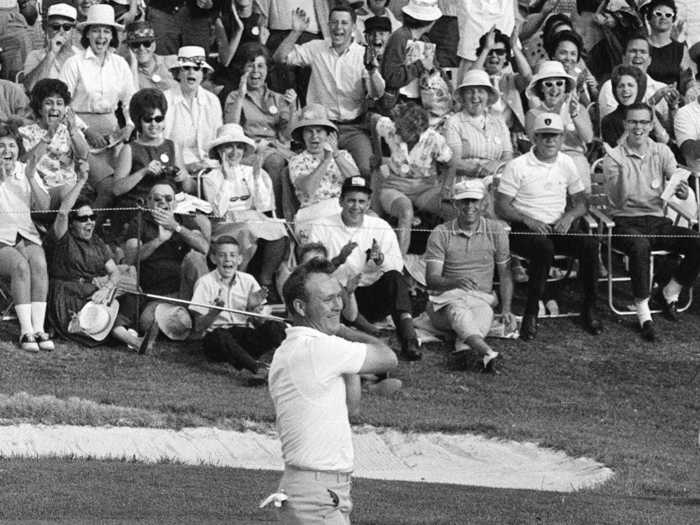
Nationality: American
Score: 276 (-12)
Winnings: $20,000 ($170,200 today)
In 1964, Palmer became the Masters' first four-time winner. But this time, there were no nail-biting finishes or surprise twists — he led the board from the second round.
The Augusta Chronicle headline announcing the win read, "Another green coat for Arnie's wardrobe."
''This is the most singularly exciting tournament for me ever," Palmer said at the presentation ceremony. "For once in my life, I planned to do something and did what I wanted."
1965: Jack Nicklaus
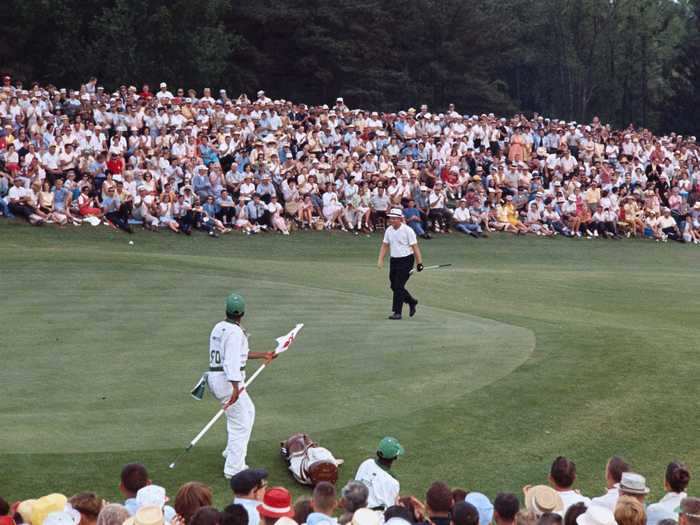
Nationality: American
Score: 271 (-17)
Winnings: $20,000 ($167,500)
Nicklaus won with a then-tournament record of 17 under par, beating Ben Hogan's previous 1953 record of 14 under. Palmer and Player tied for second, each with a comparatively paltry 8 under.
1966: Jack Nicklaus
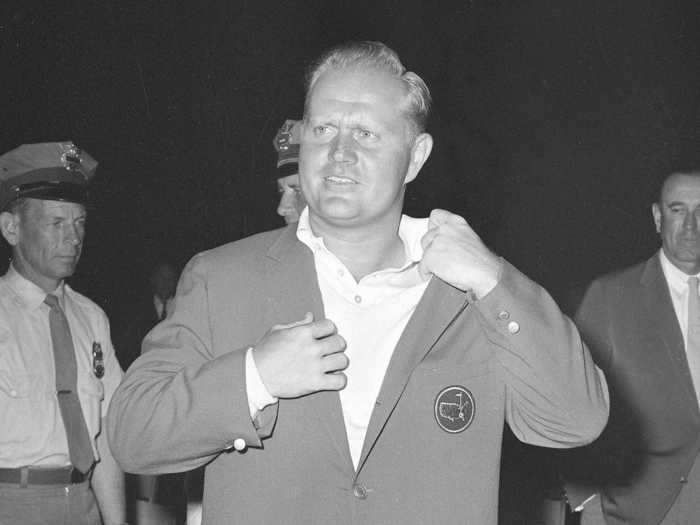
Nationality: American
Score: 288 (E)
Winnings: $20,000 ($162,900 today)
Despite an even-par score — much higher than his 271 the year prior — Nicklaus became the first back-to-back winner in Masters history. He won in an 18-hole playoff against Tommy Jacobs and Gay Brewer.
1967: Gay Brewer Jr.
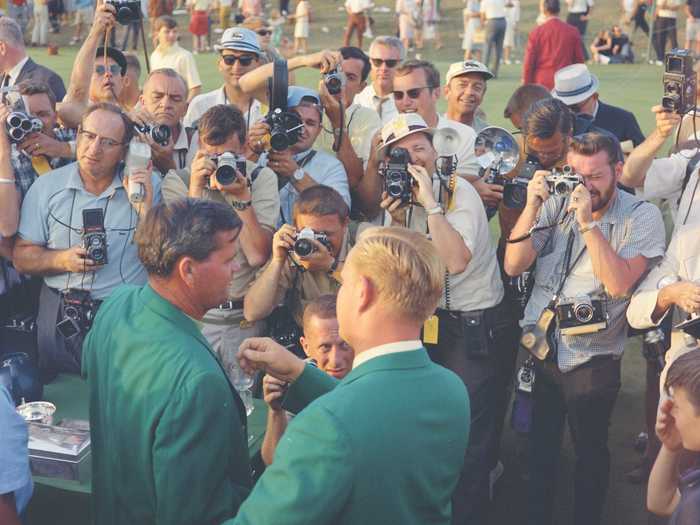
Nationality: American
Score: 280 (-8)
Winnings: $20,000 ($158,900 today)
After losing in the playoff the year prior, "Brewer won more than the coveted green jacket with his victory," the New York Times reported. "He also won redemption."
Following his loss, he knew he had to work on the mental part of the game and turned to Norman Vincent Peale's "Power of Positive Thinking," the Times reported. He even read some before his final round in 1967. Ultimately he beat Bobby Nichols by a single stroke.
1968: Bob Goalby
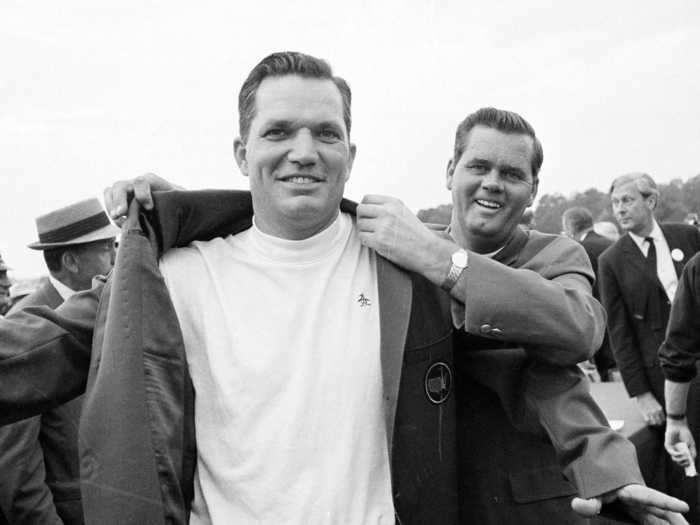
Nationality: American
Score: 277 (-11)
Winnings: $20,000 ($152,900 today)
This was another Masters win marred by controversy. Roberto De Vicenzo, from Argentina, signed an incorrect scorecard, which had him down for 66 for the final round, rather than 65. However, officials upheld the rule that a signed scorecard must stand.
Meanwhile, Goalby finished with a 66 and won the tournament. Fifty years later, he recalled getting 100 letters "saying I'm the worst so and so that ever lived."
"It was unfortunate for Roberto, but it was equally unfortunate for me," Goalby told the Palm Springs Desert Sun in 2018. "I didn't get credit for winning the tournament."
1969: George Archer
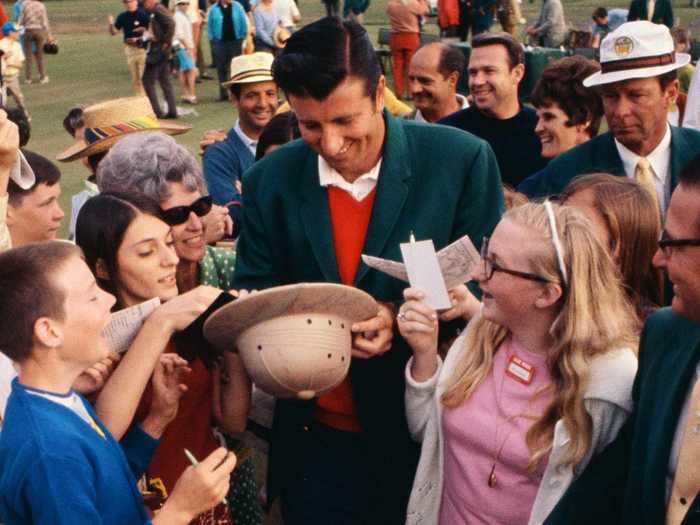
Nationality: American
Score: 281 (-7)
Winnings: $20,000 ($144,900 today)
When Archer won by a stroke, it was the first and last time he'd finish in the top 10 at the Masters. He competed in the tournament 24 times over his four-decade career.
1970: Billy Casper
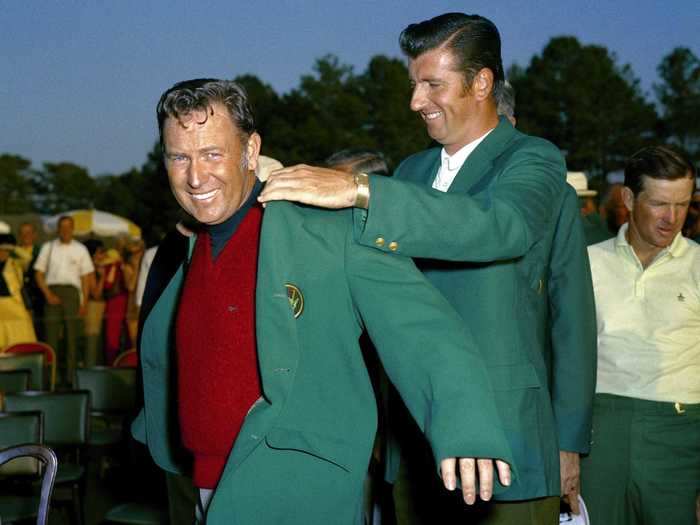
Nationality: American
Score: 279 (-9)
Winnings: $25,000 ($170,800 today)
To win the 1970 Masters, Casper beat his long-time friend Gene Littler by five shots in an 18-hole playoff.
He loved Augusta so much that when he died in 2015, he was buried in his green jacket, after his wife sought permission from Augusta National, the Augusta Chronicle reported.
1971: Charles Coody
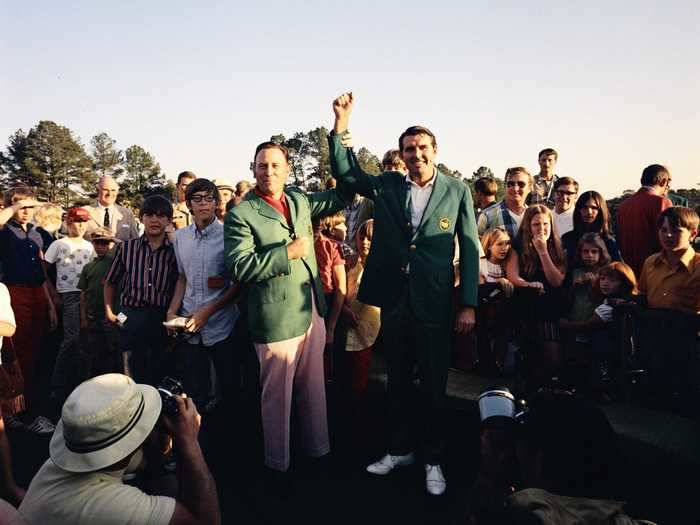
Nationality: American
Score: 279 (-9)
Winnings: $25,000 ($164,000 today)
After a breakfast of sweet potato biscuits and switching from red to black socks "for better luck," Coody won the 1971 tournament by two strokes.
1972: Jack Nicklaus
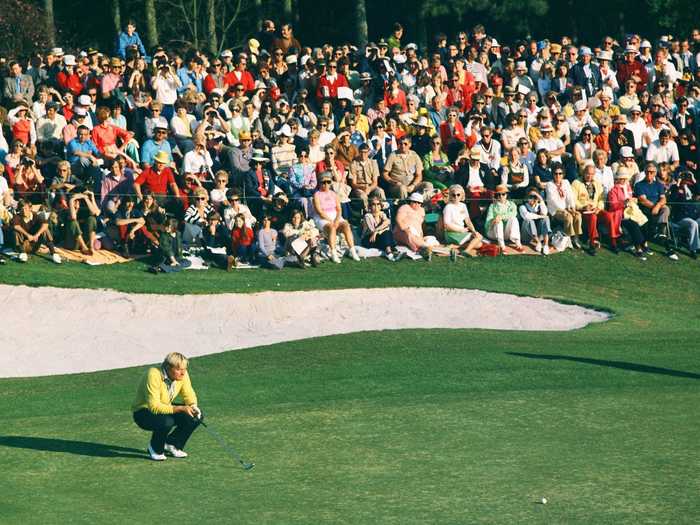
Nationality: American
Score: 286 (-2)
Winnings: $25,000 ($158,400 today)
Nicklaus won his fourth of six Masters wire-to-wire, beating his runners-up by three strokes. It was also the first tournament without its co-founder and president, Bobby Jones, who died the previous December.
"It was a big empty hole for the week," Nicklaus said, according to the Golf Channel. "I enjoyed our conversation. I always enjoyed being with him. He was a great guy and I always walked away learning something. I was a big fan. He was my idol."
1973: Tommy Aaron
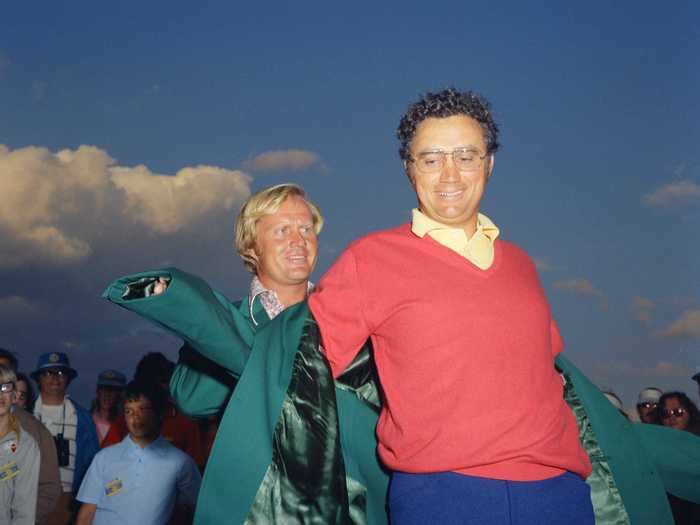
Nationality: American
Score: 283 (-5)
Winnings: $30,000 ($181,000 today)
"Winning the Masters for me was a dream come true," Aaron wrote for the Augusta Chronicle in 2012. "From the time I started playing in Gainesville, Ga., northeast of Atlanta, I thought the Masters was the only golf tournament in the world."
1974: Gary Player
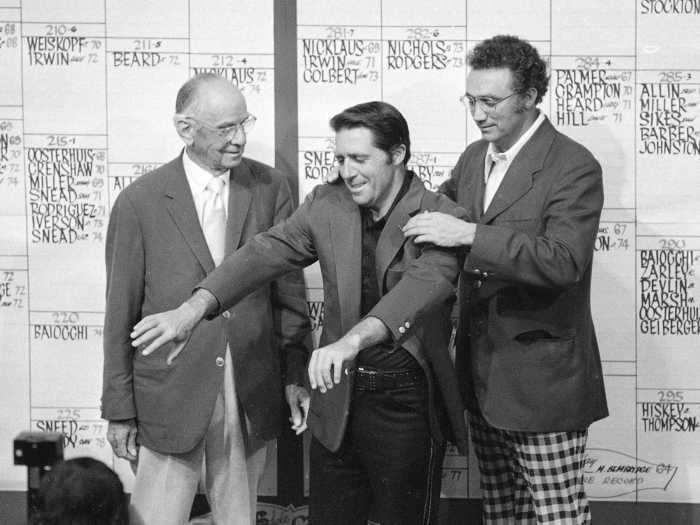
Nationality: South African
Score: 278 (-10)
Winnings: $35,000 ($191,800 today)
For his second of three Masters wins, Player had "the most stylish day ever," according to GQ.com, which noted that he wore "an all-black fit that had become his signature move of intimidation."
1975: Jack Nicklaus
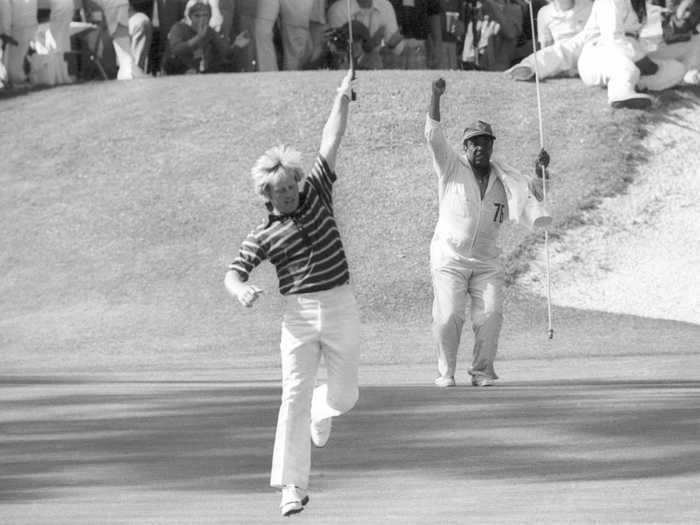
Nationality: American
Score: 276 (-12)
Winnings: $40,000 ($199,000 today)
In the final round, it was a nail-bitingly close battle between Nicklaus, Tom Weiskopf, and Johnny Miller, in what the Chronicle called "one of the great shootouts in Masters history."
Ultimately Weiskopf and Miller tied for second, each just a shot behind Nicklaus.
"In all the time I have played golf, I thought this was the most exciting display I had ever seen,'' he later said.
1976: Raymond Floyd
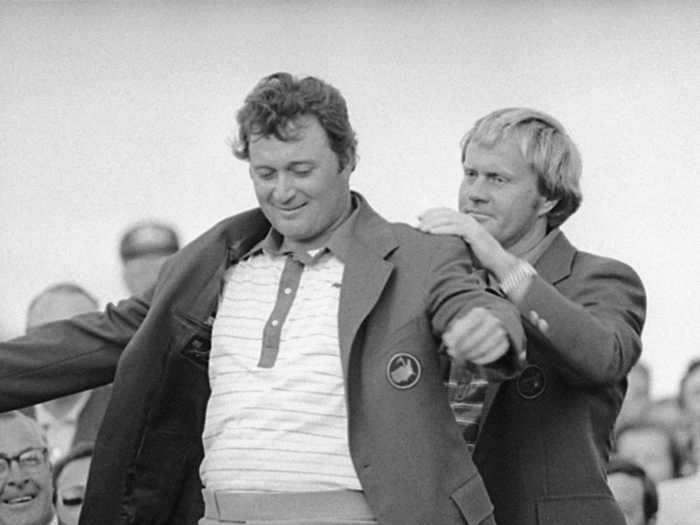
Nationality: American
Score: 271 (-17)
Winnings: $40,000 ($187,500 today)
Floyd won wire-to-wire in 1976, beating runner-up Ben Crenshaw by eight shots and finishing with an incredible 17 under, one of the best scores in tournament history. Floyd was the last wire-to-wire Masters winner until Jordan Spieth in 2015, the Associated Press noted.
1977: Tom Watson
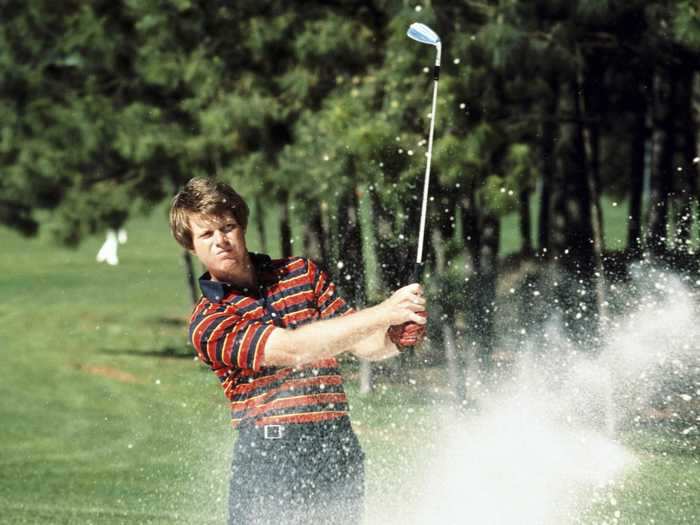
Nationality: American
Score: 276 (-12)
Winnings: $40,000 ($175,300 today)
Watson won his first of two tournament titles after a battle with defending champ, Nicklaus. He beat him by two strokes, thanks in part to an incredible 20-foot birdie on the 17th in the final round.
"Winning the Masters was the highlight of my career," Watson told the Augusta Chronicle in 2016.
1978: Gary Player
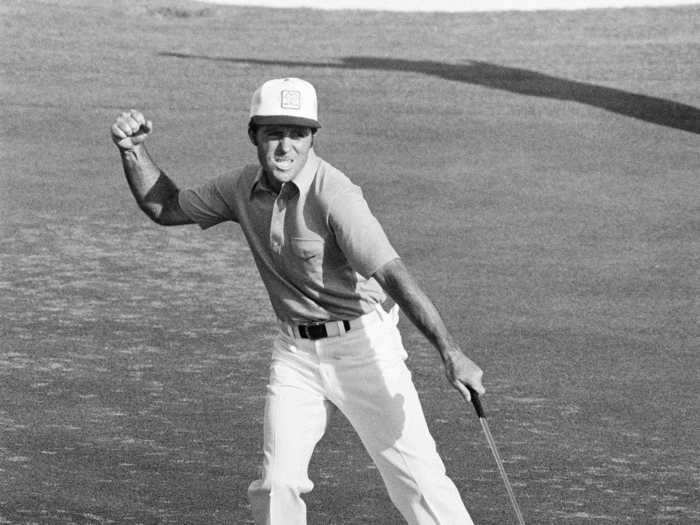
Nationality: South African
Score: 277 (-11)
Winnings: $45,000 ($185,200 today)
At 42, Player won his third green jacket despite starting the final round seven shots behind the leader.
1979: Fuzzy Zoeller
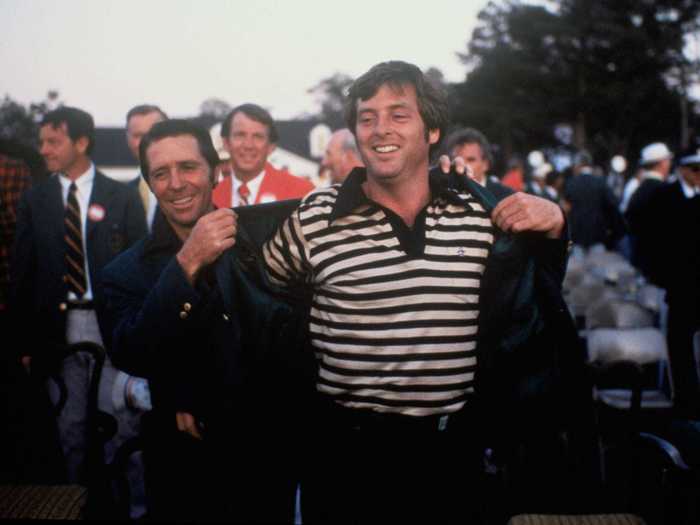
Nationality: American
Score: 280 (-8)
Winnings: $50,000 ($186,300 today)
Incredibly, 1979 was Zoeller's first Masters appearance — and he won it. Only Zoeller, Horton Smith, and Gene Sarazen have won during their first try.
1980: Seve Ballesteros
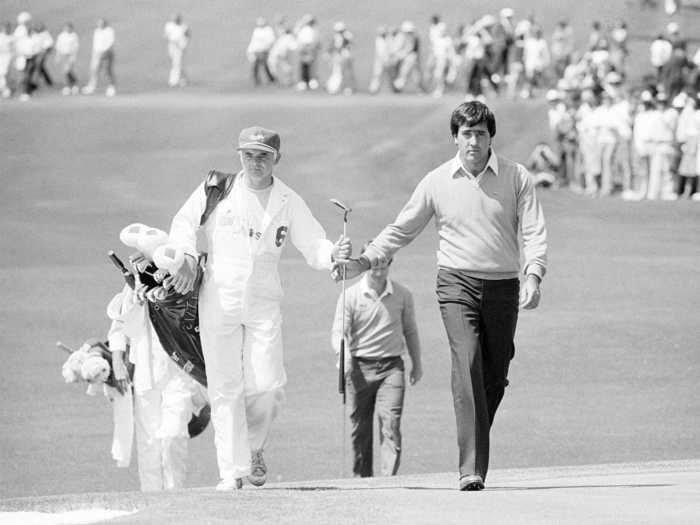
Nationality: Spanish
Score: 275 (-13)
Winnings: $55,000 ($178,600 today)
Ballesteros broke records with his 1980 win: He became the first European champion, and, at 23, he also became the tournament's then-youngest winner. The record was only bested by Tiger Woods, when he was 21, in 1997.
1981: Tom Watson
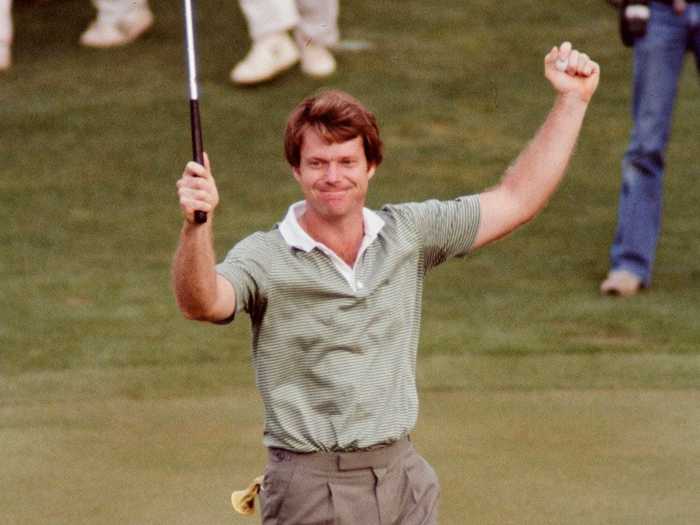
Nationality: American
Score: 280 (-8)
Winnings: $60,000 ($117,100 today)
To take his second win, "Watson hit a variety of shots as beautifully as any human can hit them," Sports Illustrated's Dan Jenkins reported in 1981.
He had to overcome slick new greens — they'd changed from Bermuda to bentgrass — but he ended up winning with a two-shot victory.
1982: Craig Stadler
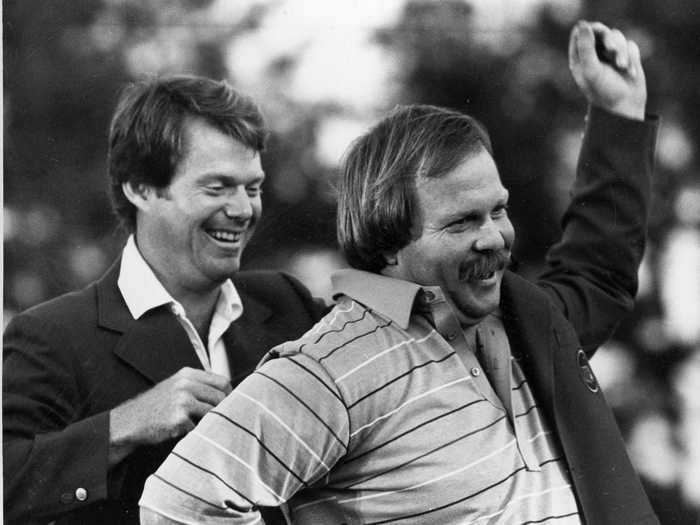
Nationality: American
Score: 284 (-4)
Winnings: $64,000 ($177,400 today)
Stadler won following the then-shortest playoff in tournament history. The Masters had introduced a sudden-death format to the playoffs in 1979, and Danny Joe Pohl missed a 6-foot putt on the first hole, giving Stadler an immediate win.
"It took 8 to 10 seconds to realize what had happened," he told the Chronicle.
1983: Seve Ballesteros
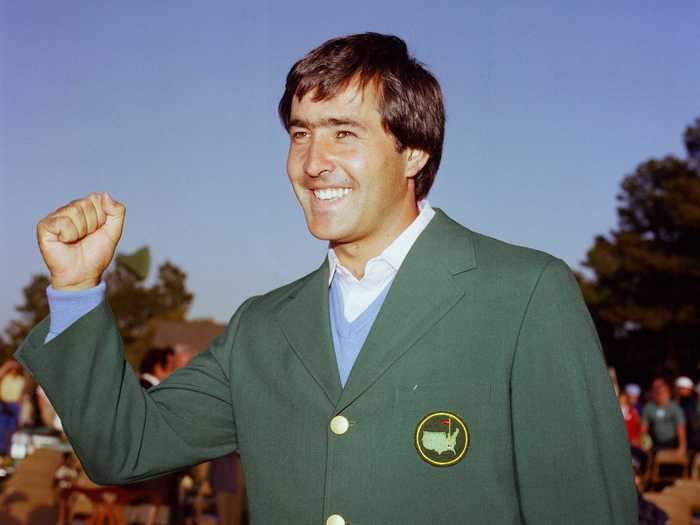
Nationality: Spanish
Score: 280 (-8)
Winnings: $90,000 ($240,100 today)
In his second win, Ballesteros won by four shots.
"It was like he was driving a Ferrari and everybody else was in Chevrolets," runner-up Tom Kite said.
1984: Ben Crenshaw
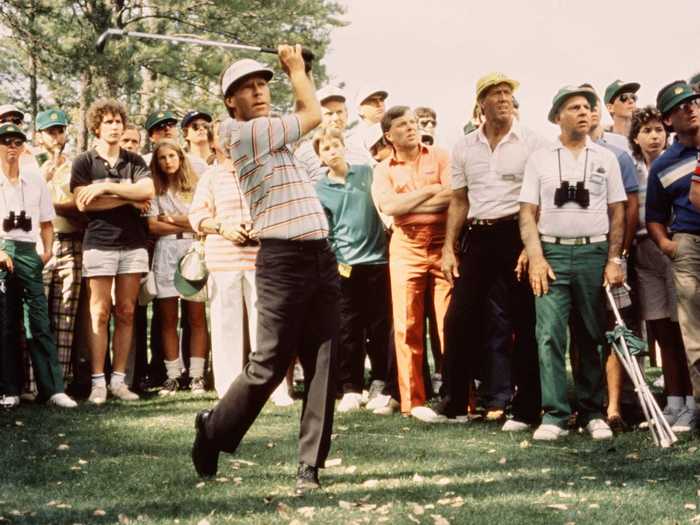
Nationality: American
Score: 277 (-11)
Winnings: $108,000 ($275,500 today)
Crenshaw, known as one of the best putters in the history of the game, putted a remarkable 60-foot birdie on the 10th on the final day.
At the time of his win, he reportedly still used the same putter he'd been given as a 15th birthday present from his dad. It was nicknamed "Little Ben."
1985: Bernhard Langer
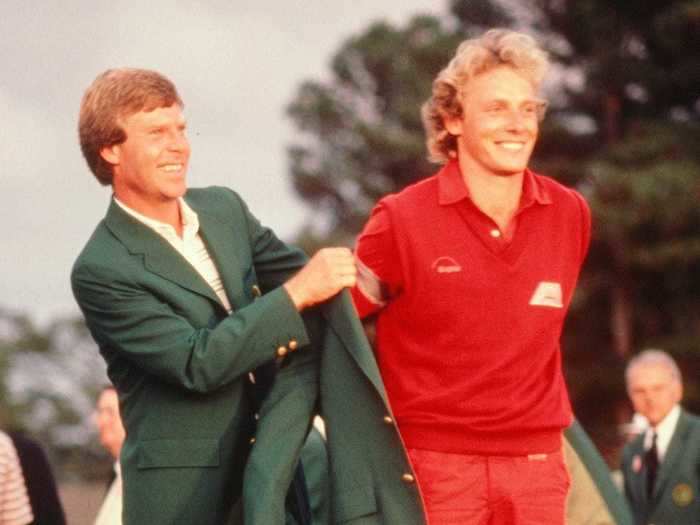
Nationality: German
Score: 282 (-6)
Winnings: $126,000 ($310,000 today)
The 1985 Masters was Langer's first win in America.
1986: Jack Nicklaus
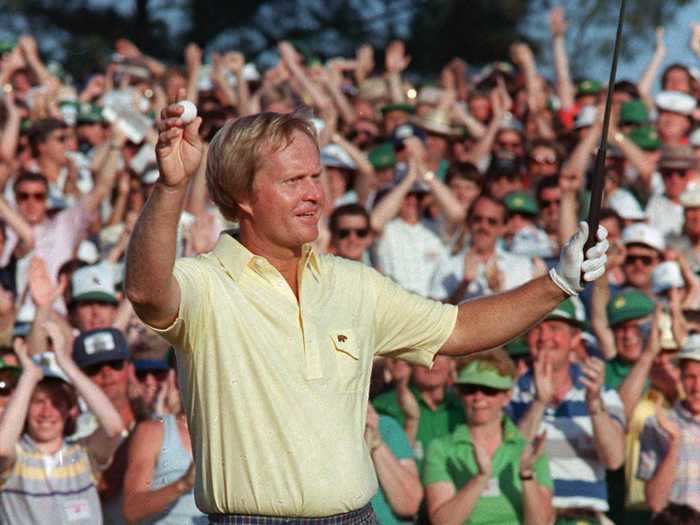
Nationality: American
Score: 279 (-9)
Winnings: $144,000 ($348,700 today)
Few had faith that Nicklaus, then 46, could win again in 1986, according to Bleacher Report, but he reminded the field what he was made of. He shot a 30 on the final back nine, ultimately winning by a shot.
It means that, as well as holding the record for the most wins (six), he also holds the record for the oldest winner in Masters history.
1987: Larry Mize
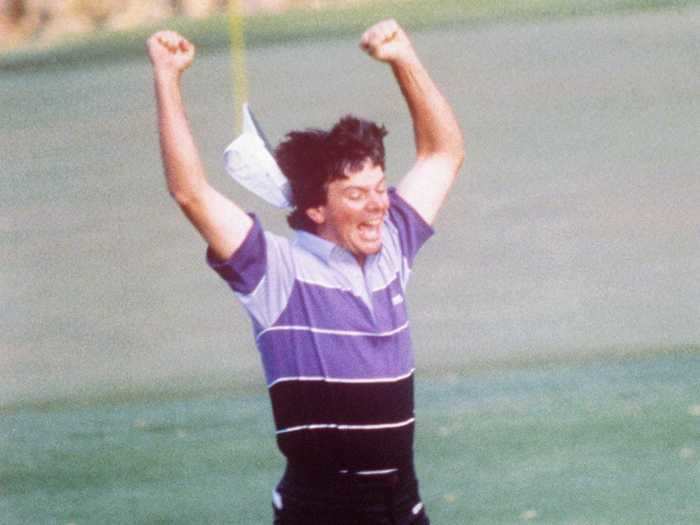
Nationality: American
Score: 285 (-3)
Winnings: $162,000 ($378,100 today)
Mize, an Augusta native, was the underdog going into a sudden-death playoff. But, in an improbable shot that has gone down in Masters history, he beat Greg Norman on the 11th with a 140-foot chip shot.
"It landed on the exact spot where I was aiming," he told Golf Digest in 2017. "I remember thinking, That's pretty good. Then it began tracking the hole. Next thing I knew I was jumping around and going crazy."
1988: Sandy Lyle
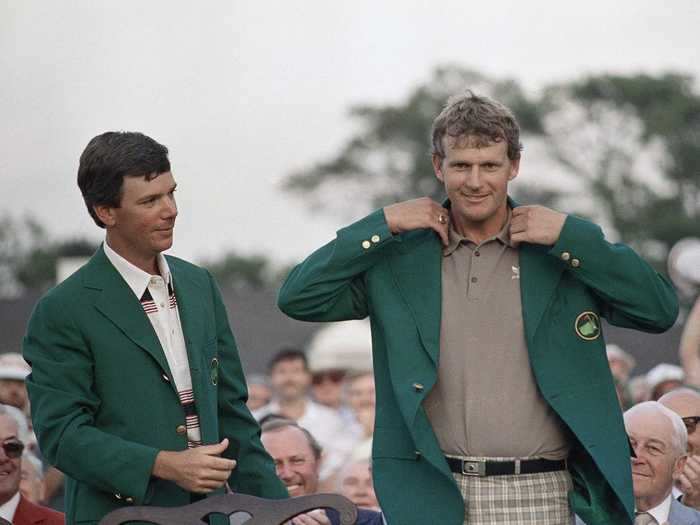
Nationality: British (Scottish)
Score: 281 (-7)
Winnings: $183,000 ($411,000 today)
With a one-stroke lead, Lyle became the first Brit to win the Masters — although fellow Brits would take the next three wins, as well.
1989: Nick Faldo
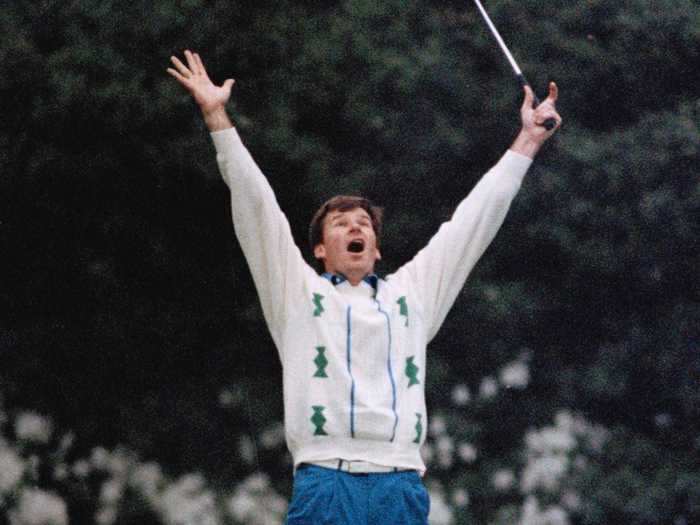
Nationality: British (English)
Score: 283 (-5)
Winnings: $200,000 ($427,300 today)
In his first of three Masters wins, Faldo beat Scott Hoch on the second hole of a sudden-death playoff. On the first hole, Hoch missed a 2-foot putt that would've won him the title.
1990: Nick Faldo
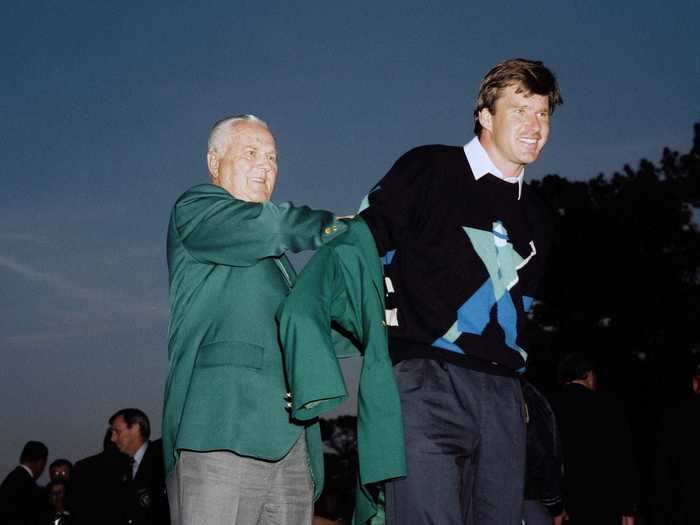
Nationality: British (English)
Score: 278 (-10)
Winnings: $225,000 ($459,100 today)
Faldo ended up in a sudden-death playoff again, this time with Raymond Floyd. As the defending champion, Faldo would've helped Floyd into his green jacket, should he win. The thought of that motivated him, he later told the BBC.
"I kept saying to myself, 'I'm not doing that, I'm not putting the jacket on him,'" Faldo said.
The playoff lasted just two holes before Faldo won, becoming the first consecutive champion since Nicklaus in 1966. Chairman Hord Hardin helped him into his second green jacket.
1991: Ian Woosnam
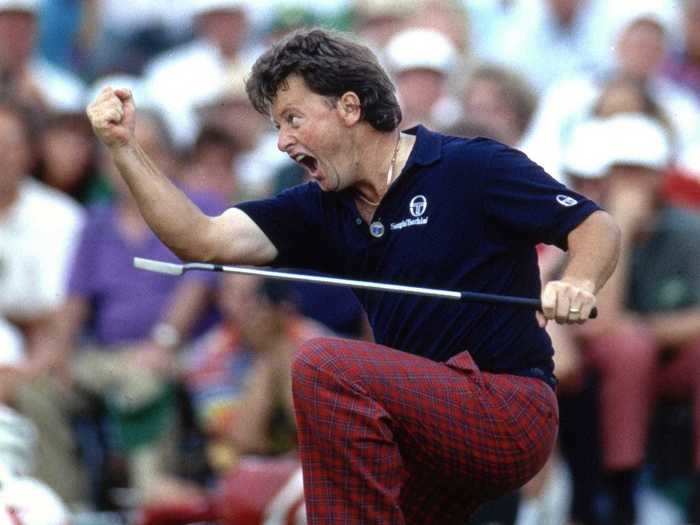
Nationality: British (Welsh)
Score: 277 (-11)
Winnings: $243,000 ($472,700 today)
After battling former champ Tom Watson and Spain's José María Olazábal all day in the final round, Woosnam eventually took the victory with a 6-foot putt.
"You dream of holing a putt on the last hole to win the Masters,'' Woosnam said. "The putt will be in my memory for a long time.''
1992: Fred Couples
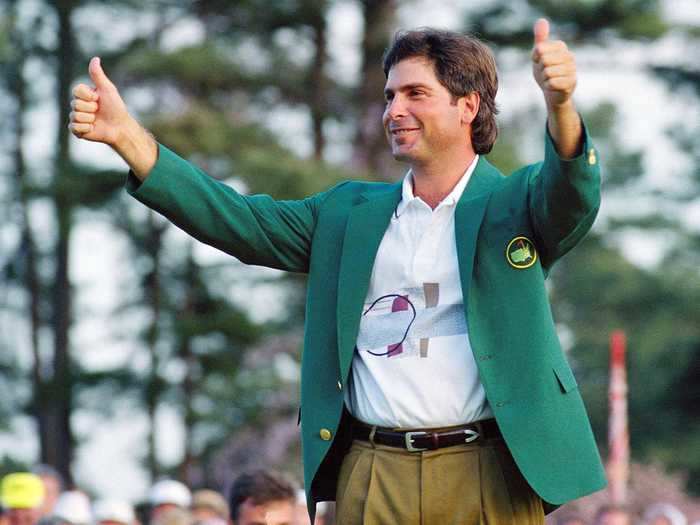
Nationality: American
Score: 275 (-13)
Winnings: $270,000 ($509,100 today)
At the 12th, Couples tried to play it safe, when his ball hit the bank that leads to Rae's Creek. Miraculously, it stayed in the long grass and didn't roll into the water.
"That's the most nervous I have ever been, and that was the biggest break of my life," Couples told USA Today.
He chipped in for par and went on to win by two strokes over Raymond Floyd.
1993: Bernhard Langer
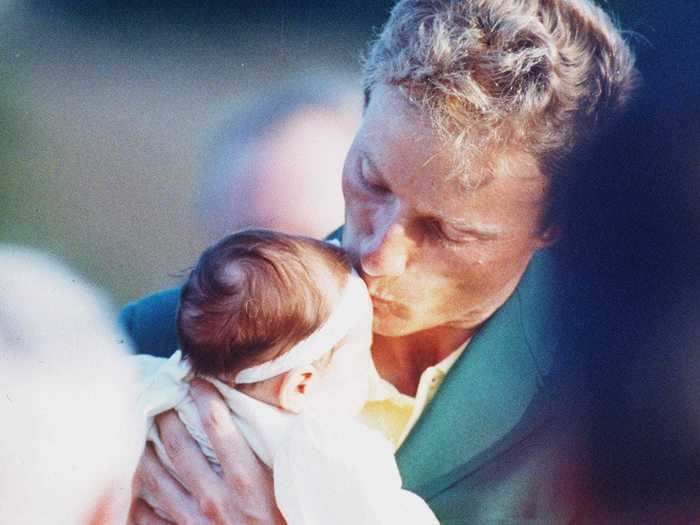
Nationality: German
Score: 277 (-11)
Winnings: $306,000 ($558,900 today)
After winning his second Masters title by four strokes, Langer celebrated with kisses with his 9-week-old daughter, Christina.
1994: José María Olazábal
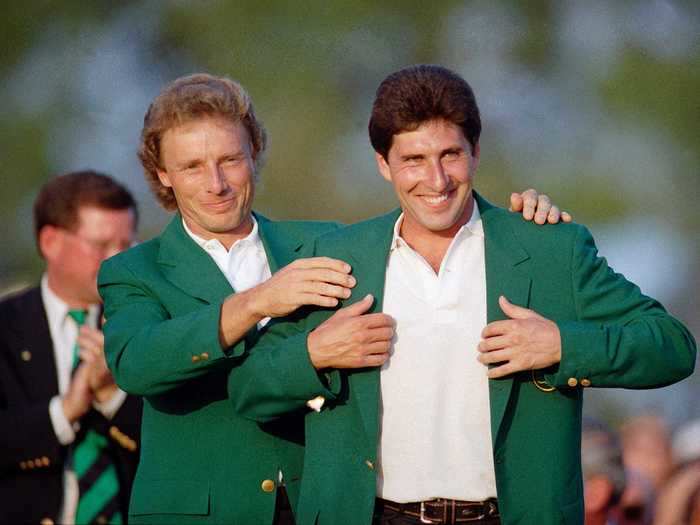
Nationality: Spanish
Score: 279 (-9)
Winnings: $360,000 ($642,400 today)
Olazábal's first win meant that, between 1988 and 1994, six of the seven winners were from outside the US.
1995: Ben Crenshaw
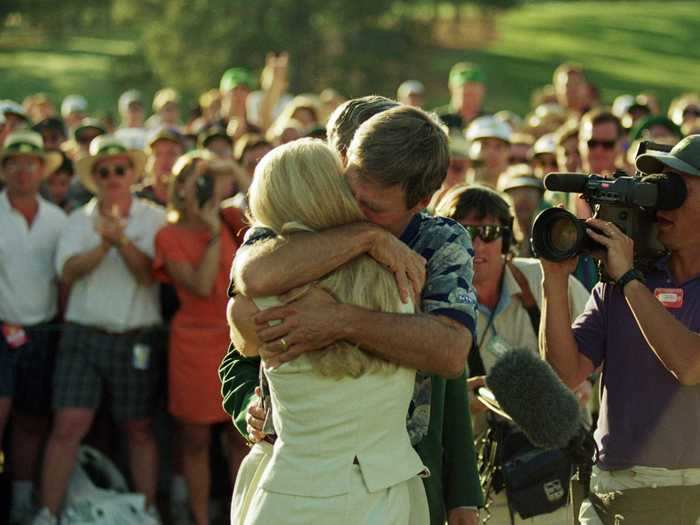
Nationality: American
Score: 274 (-14)
Winnings: $396,000 ($685,700 today)
Just days after acting as pallbearer at longtime instructor Harvey Penick's funeral, Crenshaw took the lead in the 1995 tournament with a steady game.
"Nowhere does he make note of the emotions that are bubbling up inside," Golf.com reported.
But after getting a bogey on the 18th in the final round, winning the tournament, he put his head in his hands and cried, doubling over with emotion.
"Even now, people still want to talk to me about '95," he told Golf magazine's Alan Shipnuck in 2020. "It seems to have touched them in some way."
"I've had a lot of blessings in my life," he added. "That week, what it meant to all the people who loved Harvey, what it meant to my family, that's one of the big ones."
1996: Nick Faldo
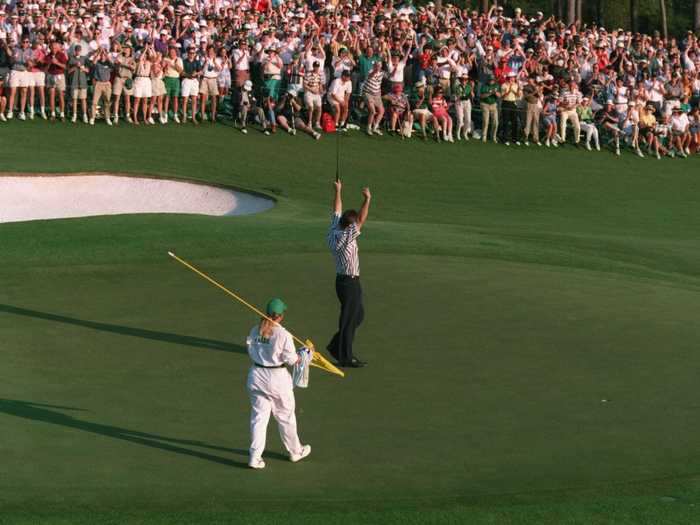
Nationality: British (English)
Score: 276 (-12)
Winnings: $450,000 ($757,200 today)
Faldo came back from a six-shot deficit on the Sunday to beat Greg Norman by five strokes, winning his third green jacket.
1997: Tiger Woods
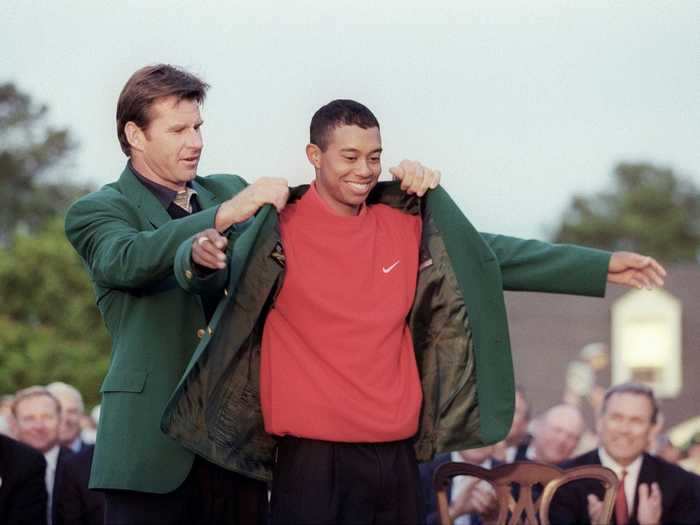
Nationality: American
Score: 270 (-18)
Winnings: $486,000 ($797,900 today)
As well as becoming the first person of color to win the Masters, Woods was — and still is — its youngest champion, at just 21. He also set a new record for the lowest 72-hole score (270) which held for more than two decades until Dustin Johnson beat it by two strokes in 2020.
In fact, Woods set or tied 27 records with his win that day.
1998: Mark O'Meara
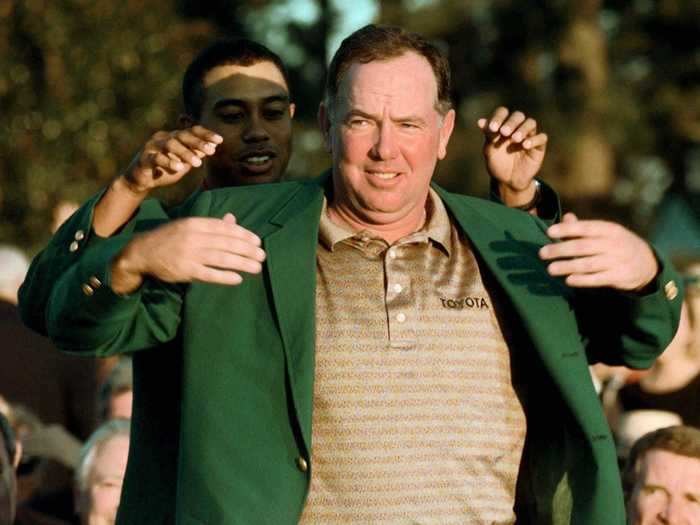
Nationality: American
Score: 279 (-9)
Winnings: $576,000 ($932,300 today)
"I don't think anybody had me on their radar screen to win the Masters at 41 years of age, including myself," O'Meara later told PGATour.com.
But win he did. He birdied the final two holes to win by a stroke.
"The cards just kind of all aligned for me that week," he said.
1999: José María Olazábal
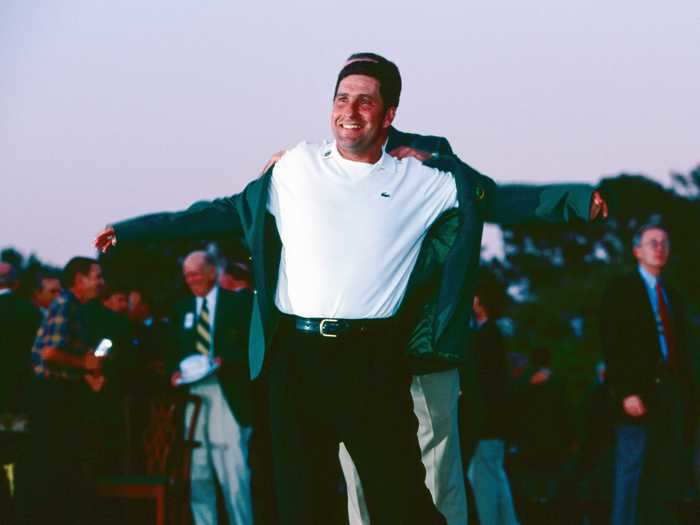
Nationality: Spanish
Score: 280 (-8)
Winnings: $720,000 ($1,139,400 today)
Four years before his second win, Olazábal had quit the game, plagued by a foot problem that left him with a limp. With no cure in sight, he wanted to give up. He didn't play for two years.
But in 1996, he underwent back surgery that fixed the problems he had been experiencing. It gave Olazábal a new lease of life, and he headed back to the course.
At the 1999 Masters, he won after avoiding bogeys over the last 13 holes, finishing 1 under for the day.
"When I was at my lowest, I never thought about this happening again," he said, according to the Associated Press. "I thought I would never play golf again. To stand before you in a green jacket is an achievement I didn't even think about."
2000: Vijay Singh
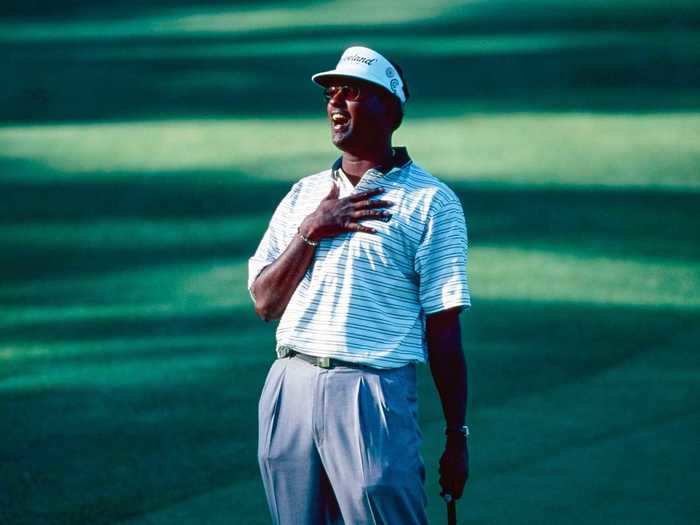
Nationality: Fijian
Score: 278 (-10)
Winnings: $828,000 ($1,271,300 today)
Singh, whose first name means "victory" in Hindi, had competed for a green jacket six times before winning in 2000. After a 67 in the second round, he took the lead in the third, ultimately beating Ernie Els by three strokes.
That year, Jack Nicklaus, then 60, made the cut for the final time.
2001: Tiger Woods
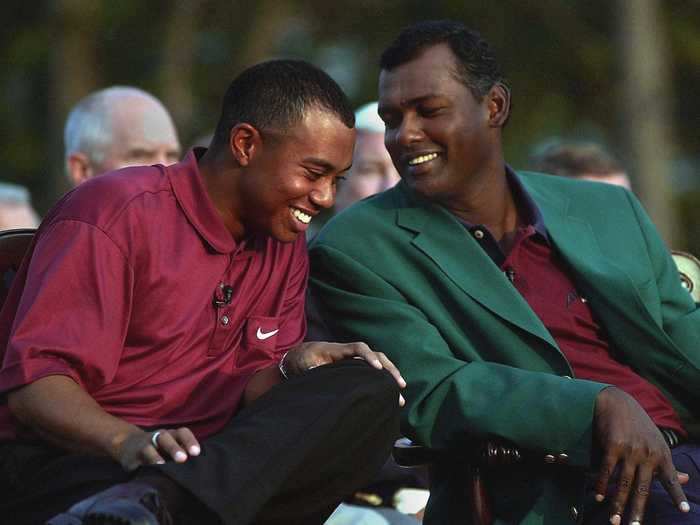
Nationality: American
Score: 272 (-16)
Winnings: $1,008,000 ($1,498,700 today)
Before his victory at Augusta, he'd won the US Open, the British Open, and the PGA Championship. Winning the Masters meant 25-year-old Woods held the four major championship titles at the same time in what was dubbed the "Tiger Slam."
"To have it happen four straight times, some of the golf gods are looking down on me the right way," Woods said.
2002: Tiger Woods
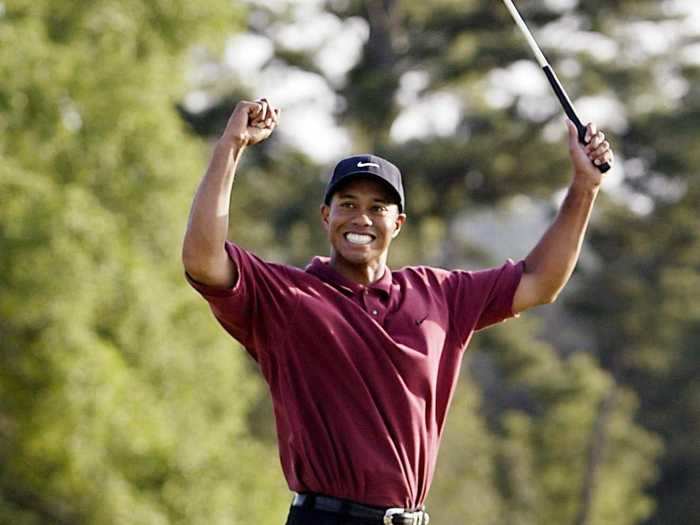
Nationality: American
Score: 276 (-12)
Winnings: $1,008,000 ($1,474,500 today)
Woods won his third Masters victory in six years and became the third player in tournament history to win back-to-back titles.
Speaking of his son in 2002, Earl Woods told Golfweek, "It's like a forest fire is coming and you don't have anything to stop it."
2003: Mike Weir
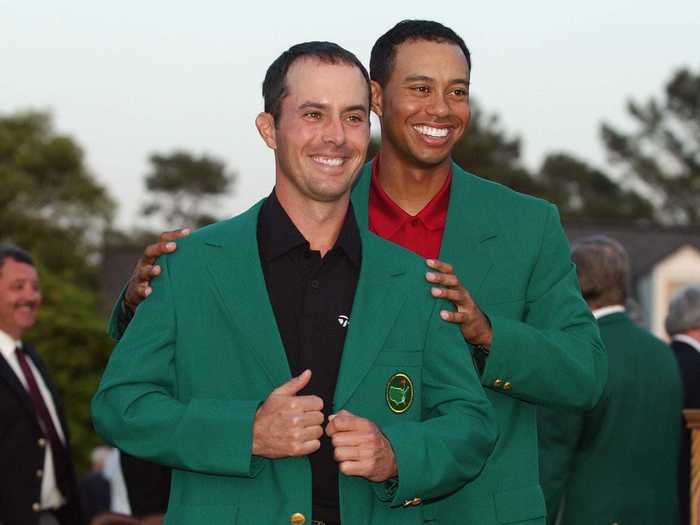
Nationality: Canadian
Score: 281 (-7)
Winnings: $1,080,000 ($1,545,500 today)
Woods was a 7/5 favorite to become the first player to win three Masters back-to-back, the Golf Channel reported, but Weir pushed that thought from his mind.
"I didn't let Tiger or anybody affect what I was doing. I was so focused on my game," Weir told the publication in 2013.
After a bogey-free final round and a one-hole playoff with Len Mattiace, Weir became the first Canadian, as well as the first left-handed player, to win the Masters.
2004: Phil Mickelson

Nationality: American
Score: 279 (-9)
Winnings: $1,117,000 ($1,562,700 today)
Mickelson, whom the Augusta Chronicle called "the world's most lovable runner-up," holed an 18-foot putt for a birdie and the Masters title. It was his first major title after 46 major starts.
"When you finally do achieve that goal, the harder the struggle, the greater the reward," Mickelson told the Chronicle.
2005: Tiger Woods
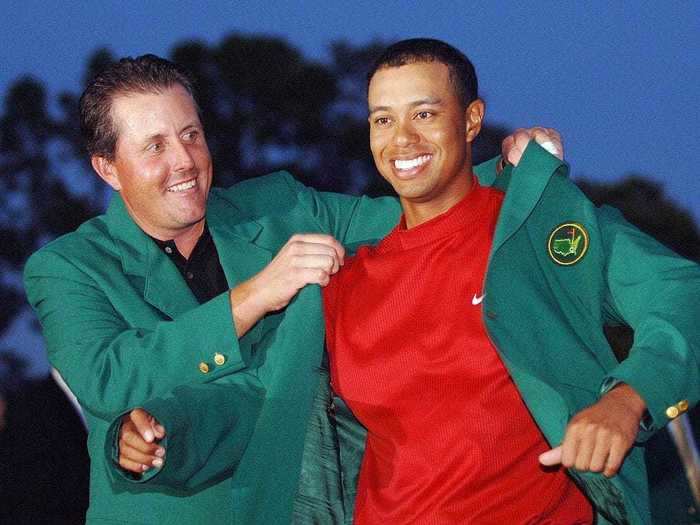
Nationality: American
Score: 276 (-12)
Winnings: $1,260,000 ($1,703,000 today)
Woods won his fourth green jacket, aged 29, after sinking a birdie putt during a one-hole sudden-death playoff against Chris DiMarco.
2006: Phil Mickelson
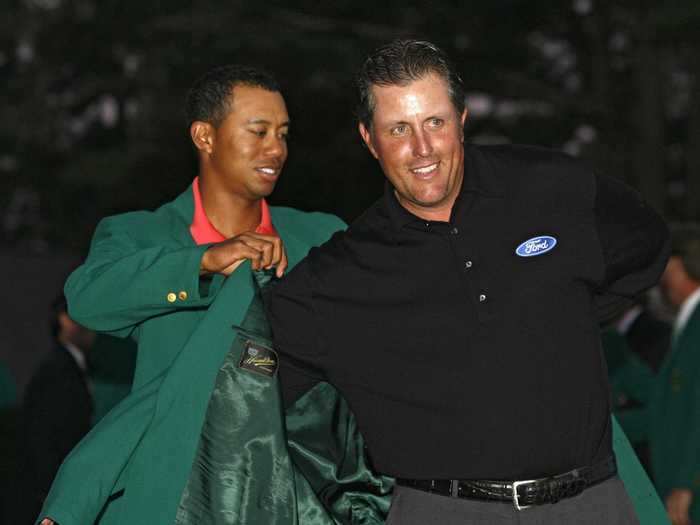
Nationality: American
Score: 281 (-7)
Winnings: $1,260,000 ($1,644,700 today)
After his 2004 Masters, Mickelson won the 2005 PGA and clinched the Masters again in 2006. Whereas he'd needed to birdie to win in 2004, this time around he approached the final hole with a three-shot lead. He won with 7 under par.
"In '04 when I won, I felt this great feeling of relief," Mickelson said, the New York Times reported. "This time, it's a great feeling of satisfaction and accomplishment to come out on top."
2007: Zach Johnson
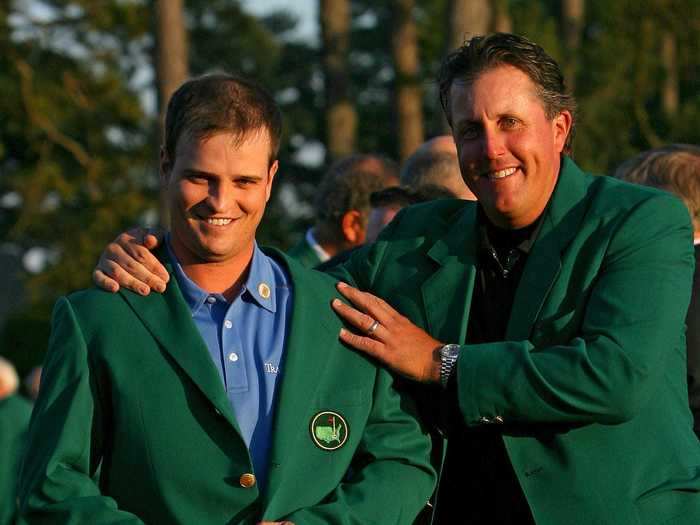
Nationality: American
Score: 289 (+1)
Winnings: $1,305,000 ($1,660,700 today)
Johnson, Golfweek reported, was an "unknown" who "never had finished better than 17th in a major." But he didn't let that stop him.
"Zach put his blinkers on and went," said Stuart Appleby, who led at one point. "[...] He knew what he was up against, the type of players who were up there. Fantastic to him. It's a great story, something different than a guy who wins 15 majors in a row."
Ultimately, Johnson won the highest-scoring Masters since 1956.
2008: Trevor Immelman
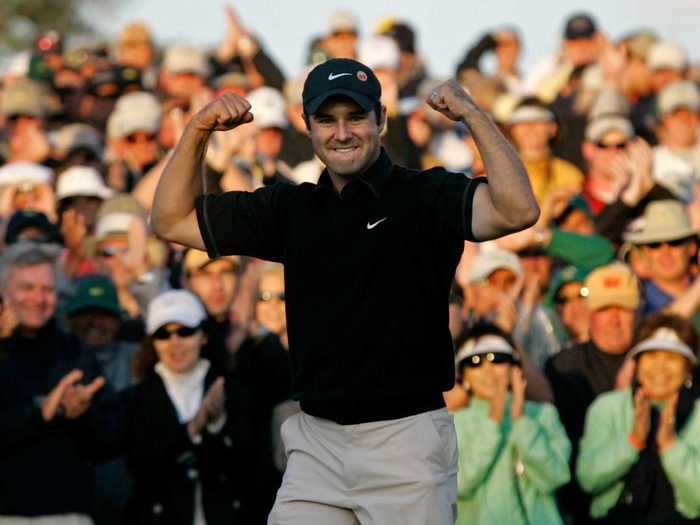
Nationality: South African
Score: 280 (-8)
Winnings: $1,350,000 ($1,652,800 today)
Immelman won three strokes ahead of runner-up Tiger Woods with 8 under. His victory came just four months after he underwent surgery to remove a tumor from his diaphragm.
"This has been the ultimate roller-coaster ride, and I hate roller coasters," Immelman said, the AP reported after his win.
"Masters champion — it's the craziest thing I've ever heard of," he added.
2009: Angel Cabrera
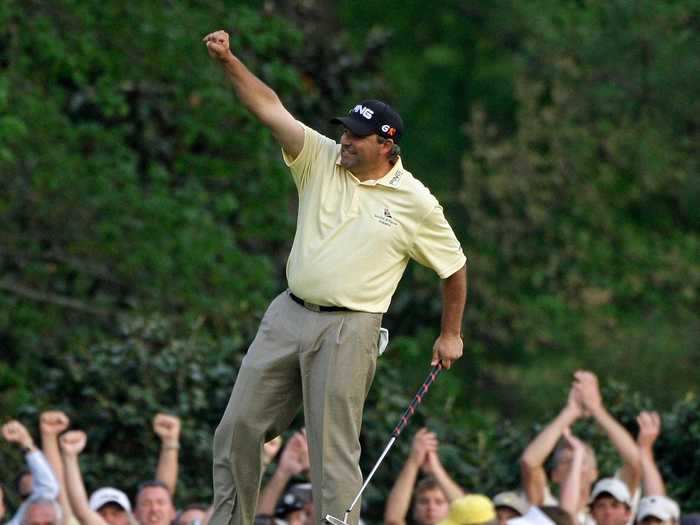
Nationality: Argentinian
Score: 276 (-12)
Winnings: $1,350,000 ($1,665,100 today)
Cabrera prevailed in a three-way playoff against Kenny Perry and Chad Campbell to become the first — and so far only — champion from Argentina and South America.
2010: Phil Mickelson
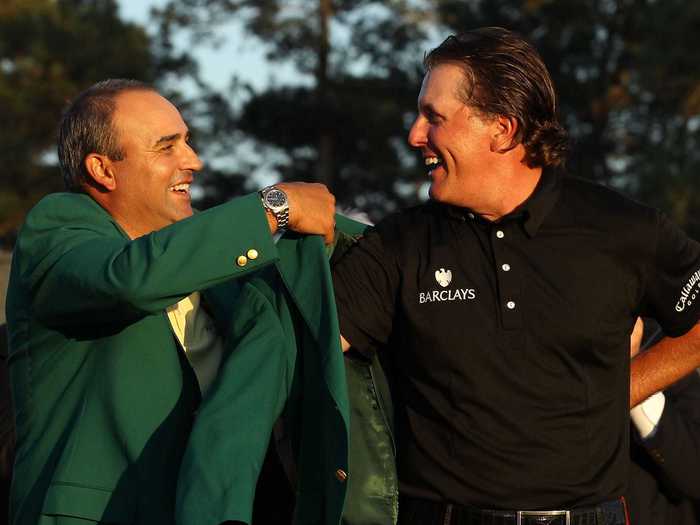
Nationality: American
Score: 272 (-16)
Winnings: $1,350,000 ($1,628,700 today)
Mickelson ended with an incredible 16 under, three strokes ahead of runner-up Lee Westwood.
He claimed his third jacket as his wife, Amy, looked on — she was in treatment for breast cancer at the time and had been unable to attend earlier rounds. (She was later declared cancer-free.)
"I was just really glad she was there," Mickelson said, the Chronicle reported. "I wasn't sure if she was going to be there today. To walk off the green and share that with her is very emotional for us. It's something we'll look back on the rest of our lives and just cherish. I'll cherish every moment of this week."
2011: Charl Schwartzel
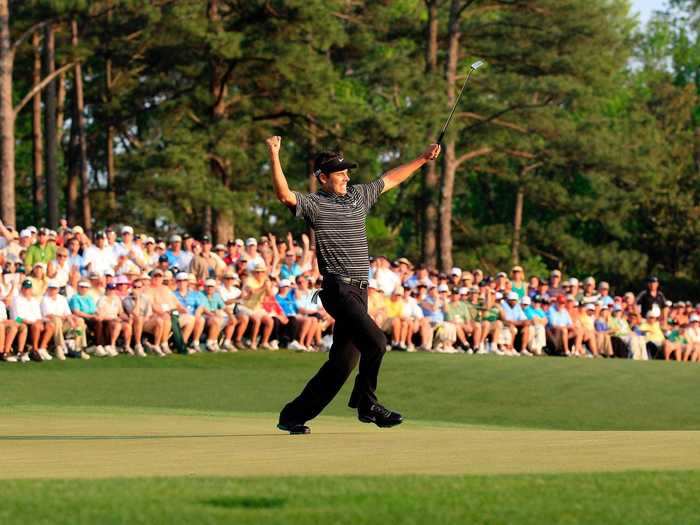
Nationality: South African
Score: 274 (-14)
Winnings: $1,440,000 ($1,684,000 today)
Schwartzel birdied his final four shots to finish with a 14-under-par total of 274. His final round of 66 was the lowest by a winner since Nick Faldo's 65 in 1989.
2012: Bubba Watson
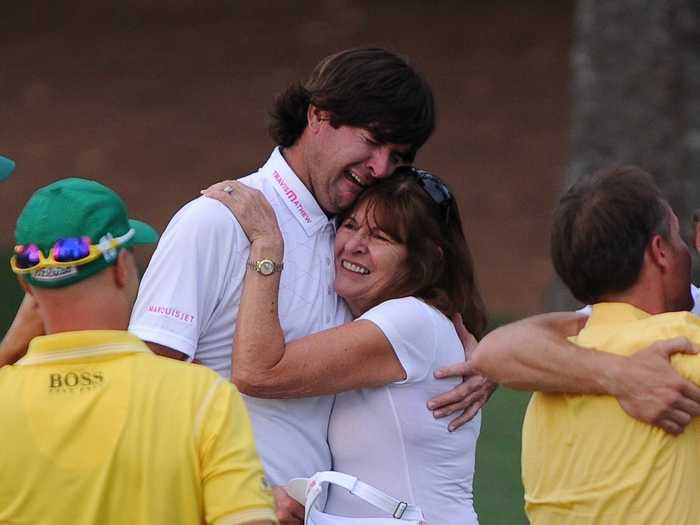
Nationality: American
Score: 278
Winnings: $1,440,000 ($1,646,100 today)
During a playoff with Louis Oosthuizen, Watson was deep in the woods on the 10th — and, it seemed, deep in trouble. But he hit a gap wedge that hooked 40 yards and ended up on the green, landing within 10 feet. Ultimately he made par and the green jacket was his.
2013: Adam Scott
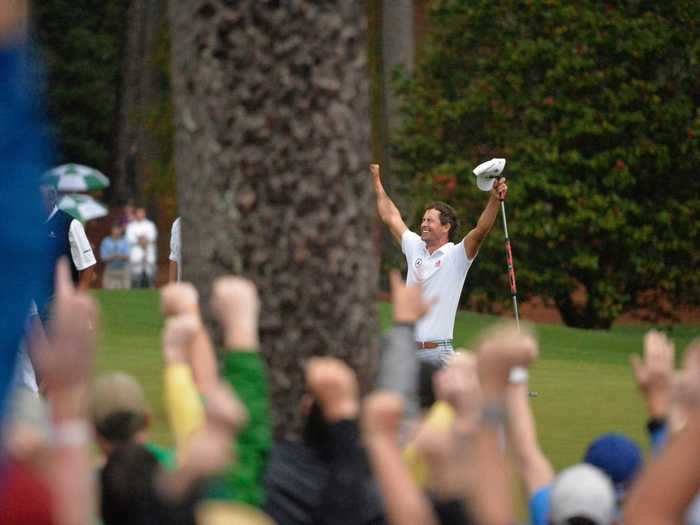
Nationality: Australian
Score: 279
Winnings: $1,440,000 ($1,628,800 today)
Scott's win was the first for Australia. Greg Norman had fought hard to get there, coming in second in 1986, 1987, and 1996, but never clinching a win.
2014: Bubba Watson
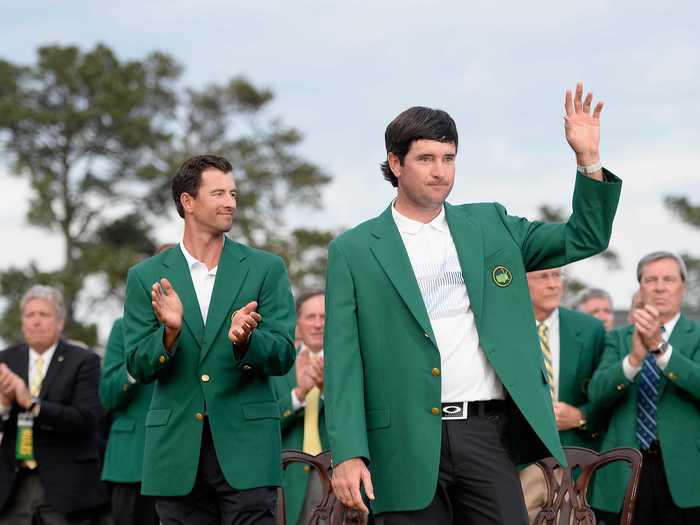
Nationality: American
Score: 280
Winnings: $1,620,000 ($1,797,300 today)
Watson earned his second green jacket in three years, beating then-20-year-old Jordan Spieth, who, before the tournament, was expected to become the youngest ever Masters winner. Ultimately Watson beat Spieth and Jonas Blixt by three shots.
2015: Jordan Spieth
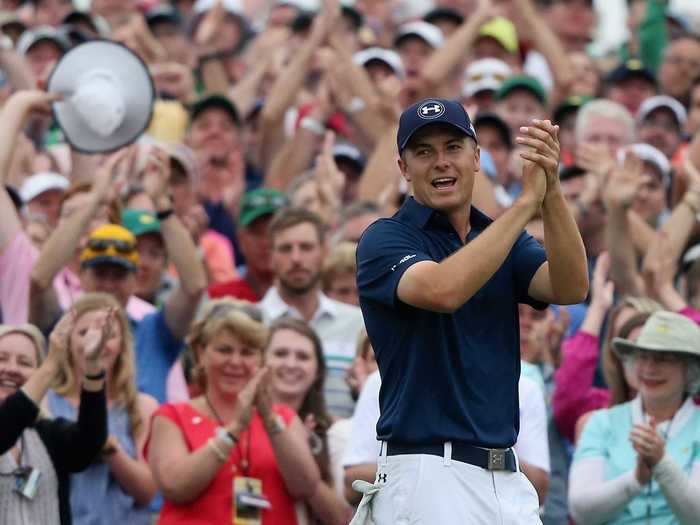
Nationality: American
Score: 270 (-18)
Winnings: $1,800,000 ($2,001,000 today)
Spieth was just 21 when he won the following year, but six months older than Woods had been in 1997. He did, however, tie Woods' 1997 final score of 18-under 270.
And, with Spieth leading by at least three shots for the whole tournament, he was the first wire-to-wire winner since Raymond Floyd in 1976.
2016: Danny Willett

Nationality: British (English)
Score: 283 (-5)
Winnings: $1,800,000 ($1,978,700 today)
With just nine holes left, Spieth was five ahead of Willett — but then things started to go very wrong for the defending champion. On the 12th, his ball went into the water and he finished the hole with a quadruple bogey.
Meanwhile, Willett's steady set of birdies and pars led him to victory, allowing him to become the first Englishman to win the tournament in 20 years.
"You dream about these kind of days and things like that, but for them to happen ... it's still mind-boggling," Willett said, ESPN reported.
2017: Sergio Garcia
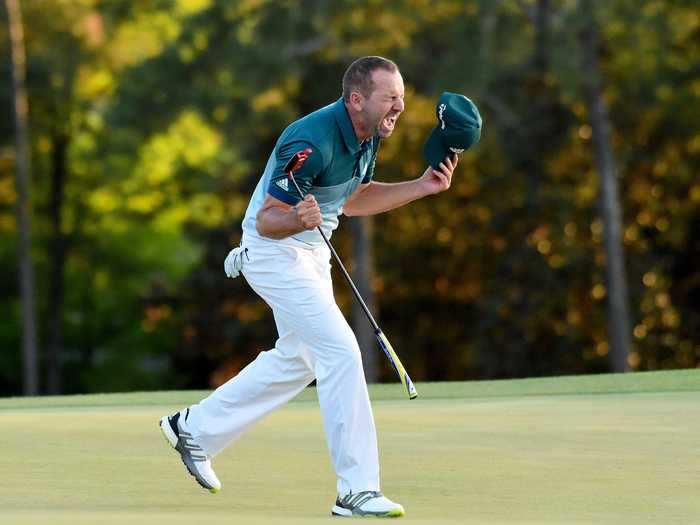
Nationality: Spanish
Score: 279
Winnings: $1,980,000 ($2,129,700 today)
Following a nail-biting duel with Justin Rose, Garcia won in a one-hole playoff, earning his first major title after 71 consecutive major championship starts. "The curse is dead," SB Nation wrote.
2018: Patrick Reed
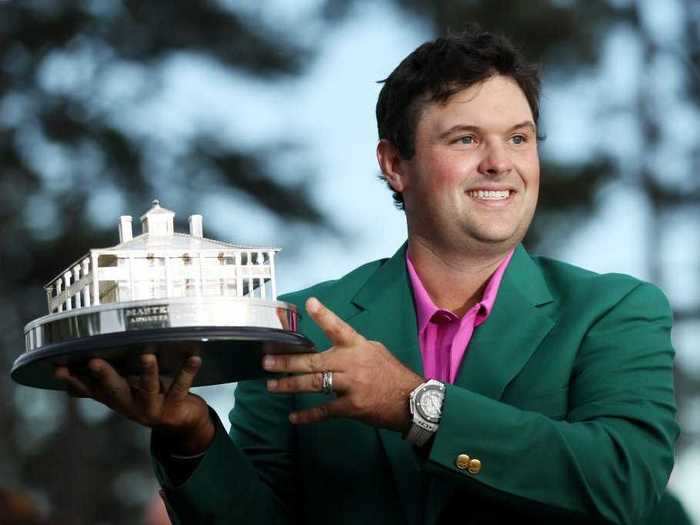
Nationality: American
Score: 273 (-15)
Winnings: $1,980,000 ($2,078,600 today)
SB Nation noted the cheers were far louder for Rory McIlroy, Jordan Spieth, and Rickie Fowler on the final day, but ultimately, it fueled Reed, who beat them all with a 15-under 273.
"It definitely wasn't easy today," he said, CBS Sports reported. "I knew it was going to be a dogfight. It's just a way of God basically saying, 'Let's see if you have it. Everyone knows you have it physically with the talent, but do you have it mentally? Can you handle the ups and downs throughout the round?'"
He added, "I just kind of went out there and just tried to play golf the best I could and tried to stay in the moment and not worry about everything else."
2019: Tiger Woods
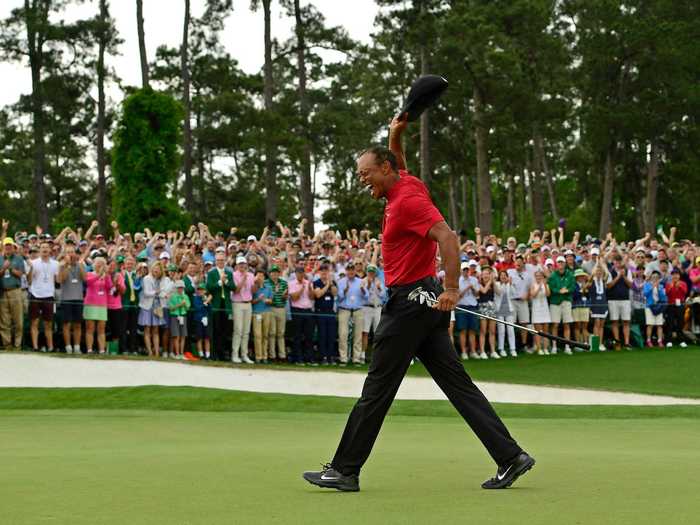
Nationality: American
Score: 275
Winnings: $2,070,000 ($2,130,500 today)
More than two decades after his first win, Woods won his fifth green jacket. On the last day, he came from behind to finish at 13 under.
"It was an epic Sunday and a great day for golf," said Fred Ridley, the chairman of Augusta National Golf Club and the Masters Tournament, the Chronicle reported. "It's one of the most amazing days in our history."
Only Nicklaus has won six Masters.
2020: Dustin Johnson
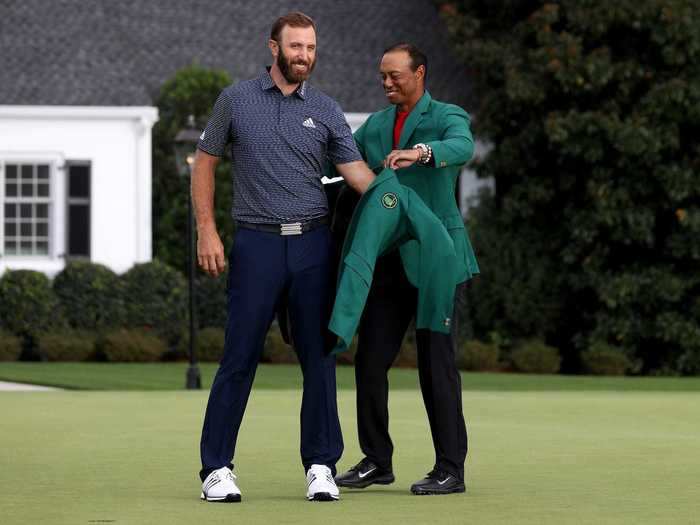
Nationality: American
Score: 268 (-20)
Winnings: $2,070,000 ($2,092,100 today)
The tournament was pushed back from April to November, due to COVID-19.
Johnson won with the lowest 72-hole score in tournament history: 20 under.
His runner up, Australian player Cameron Smith, was the first player to shoot within the 60s in every round. He finished with 15 under, tying for the lowest non-winning score in Masters history.
READ MORE ARTICLES ON
Popular Right Now
Popular Keywords
Advertisement